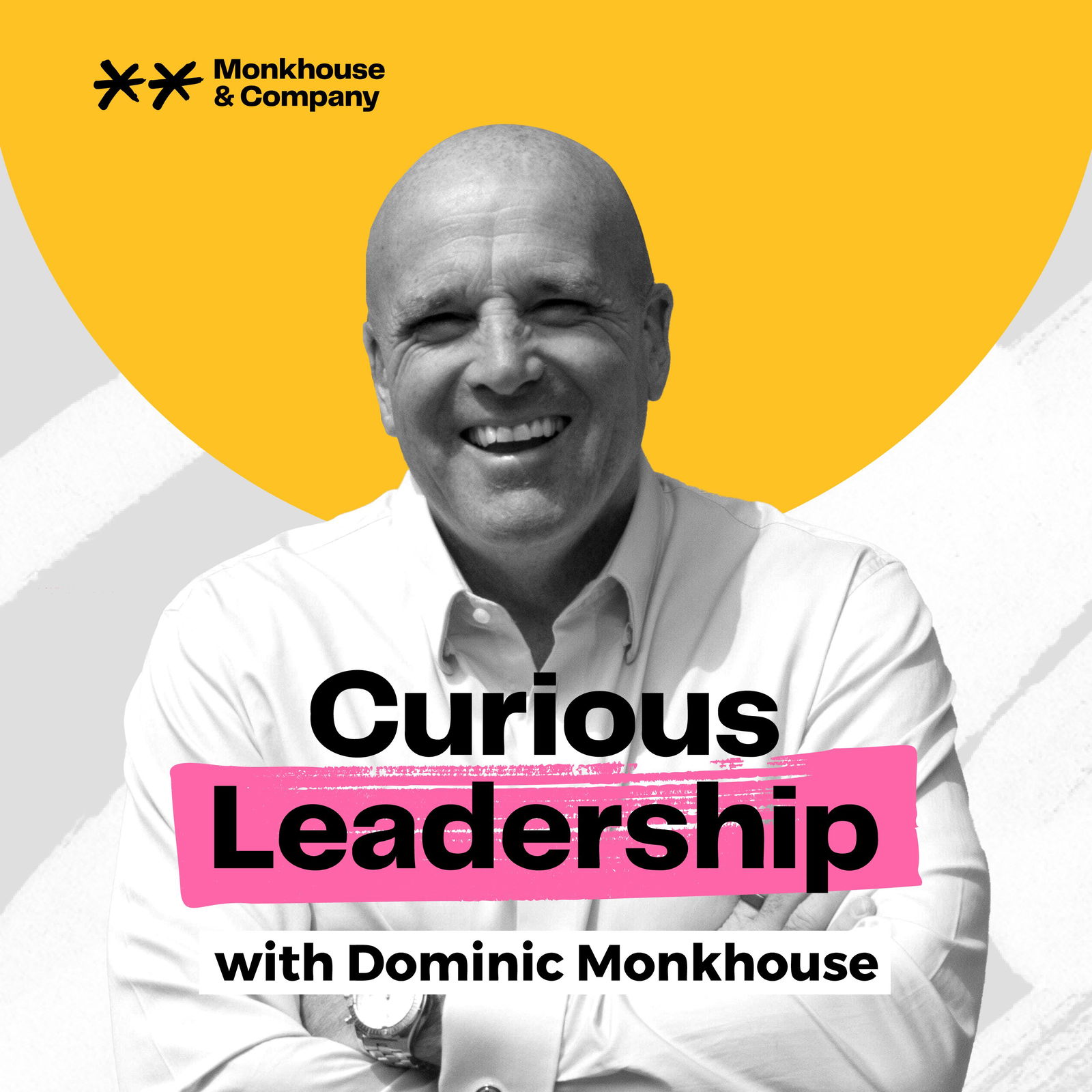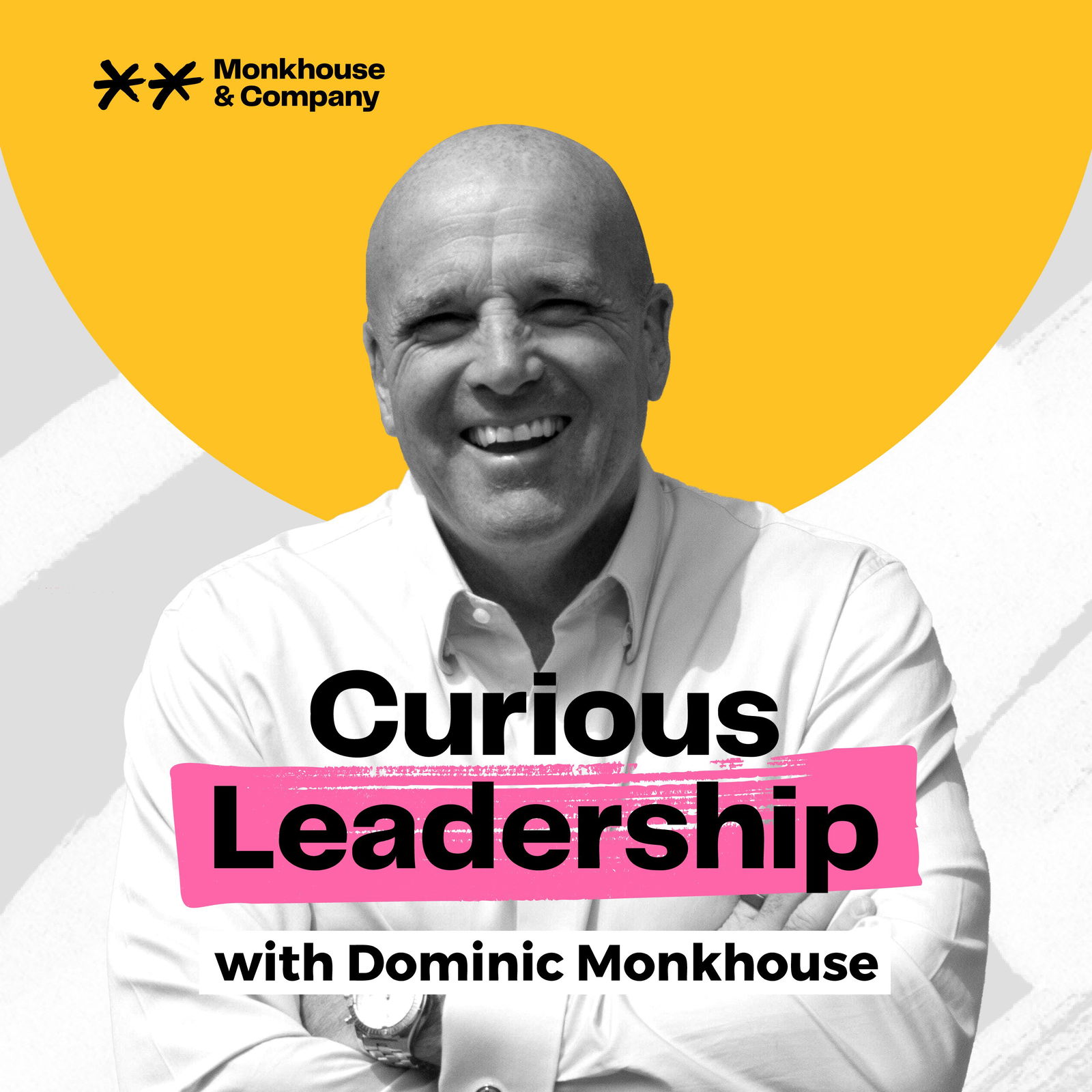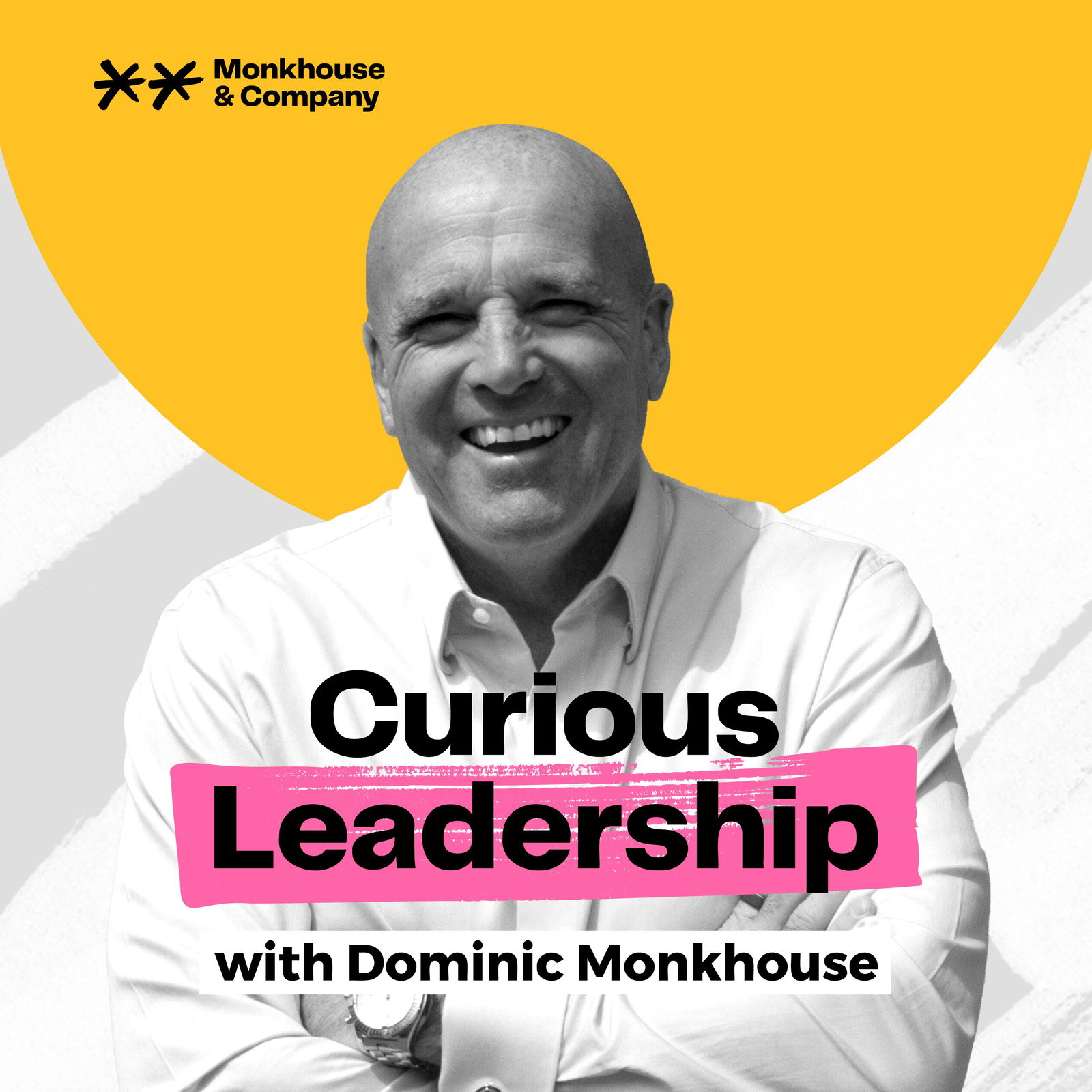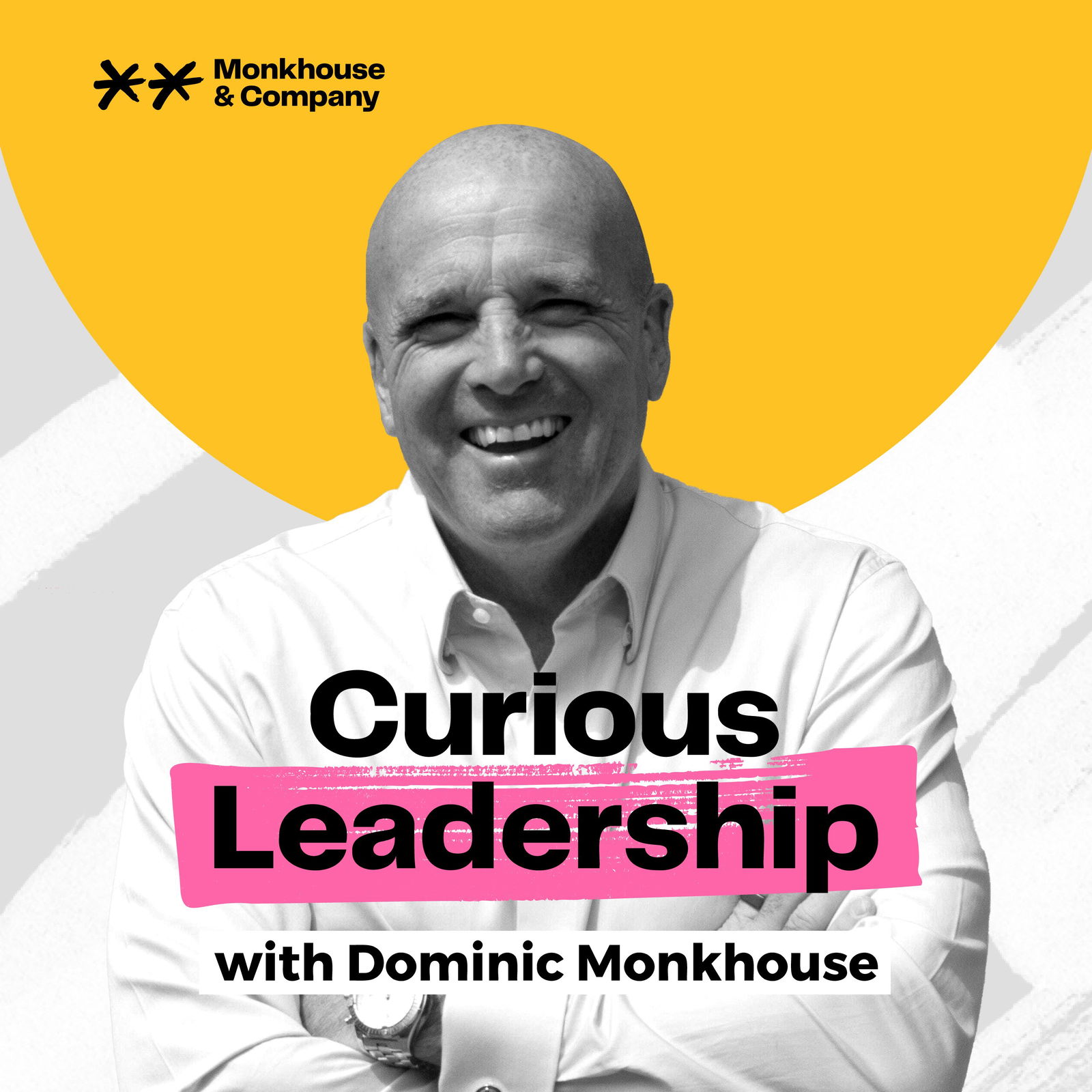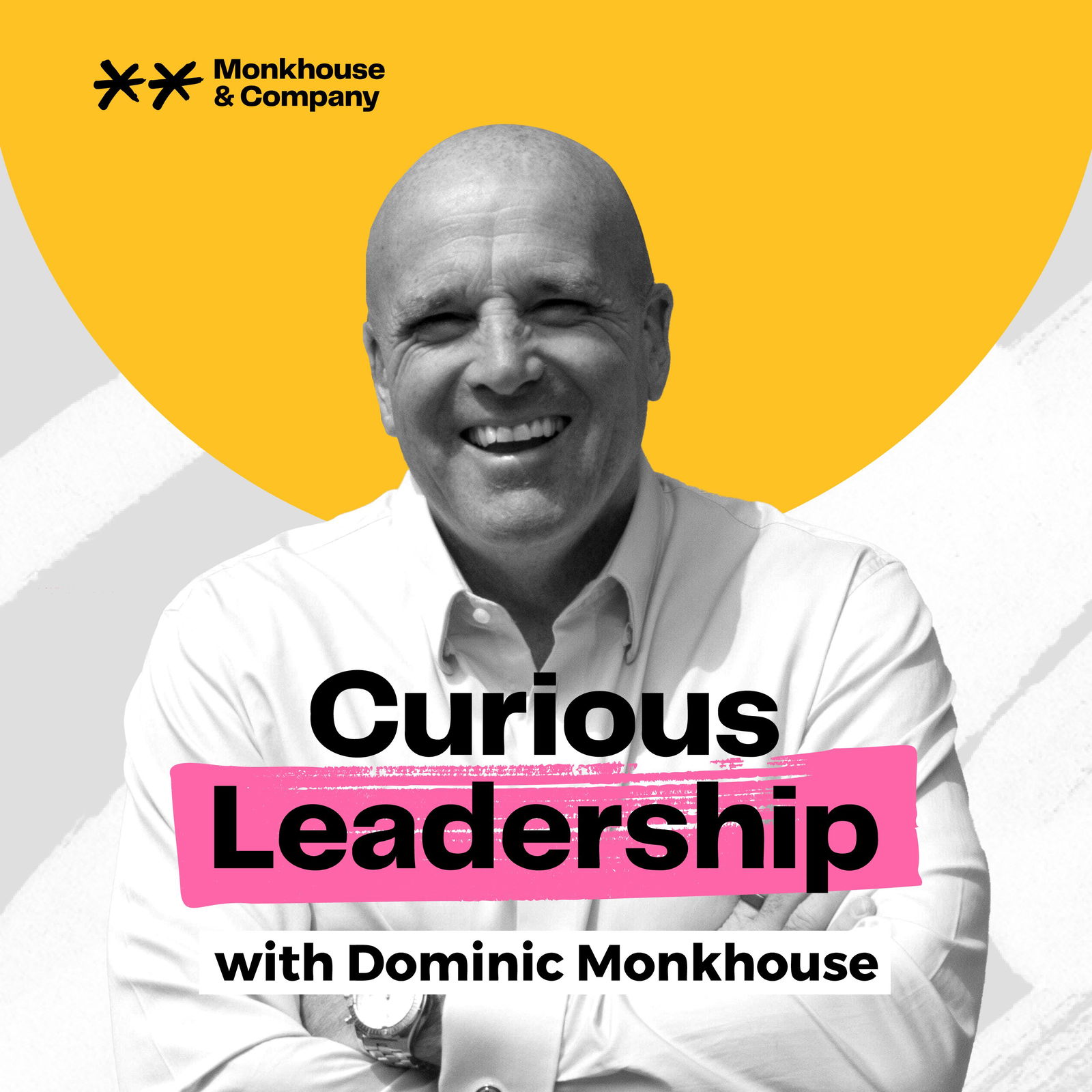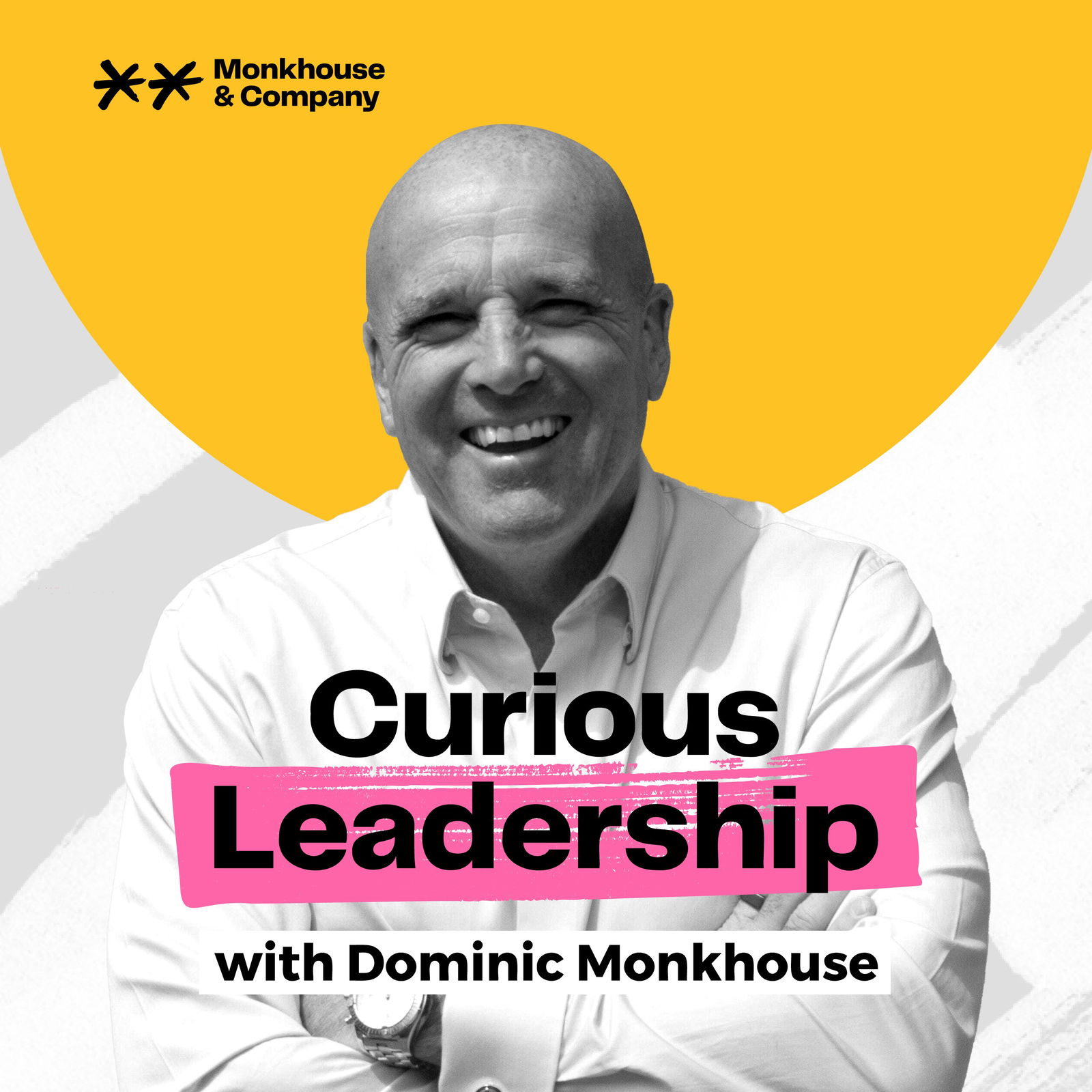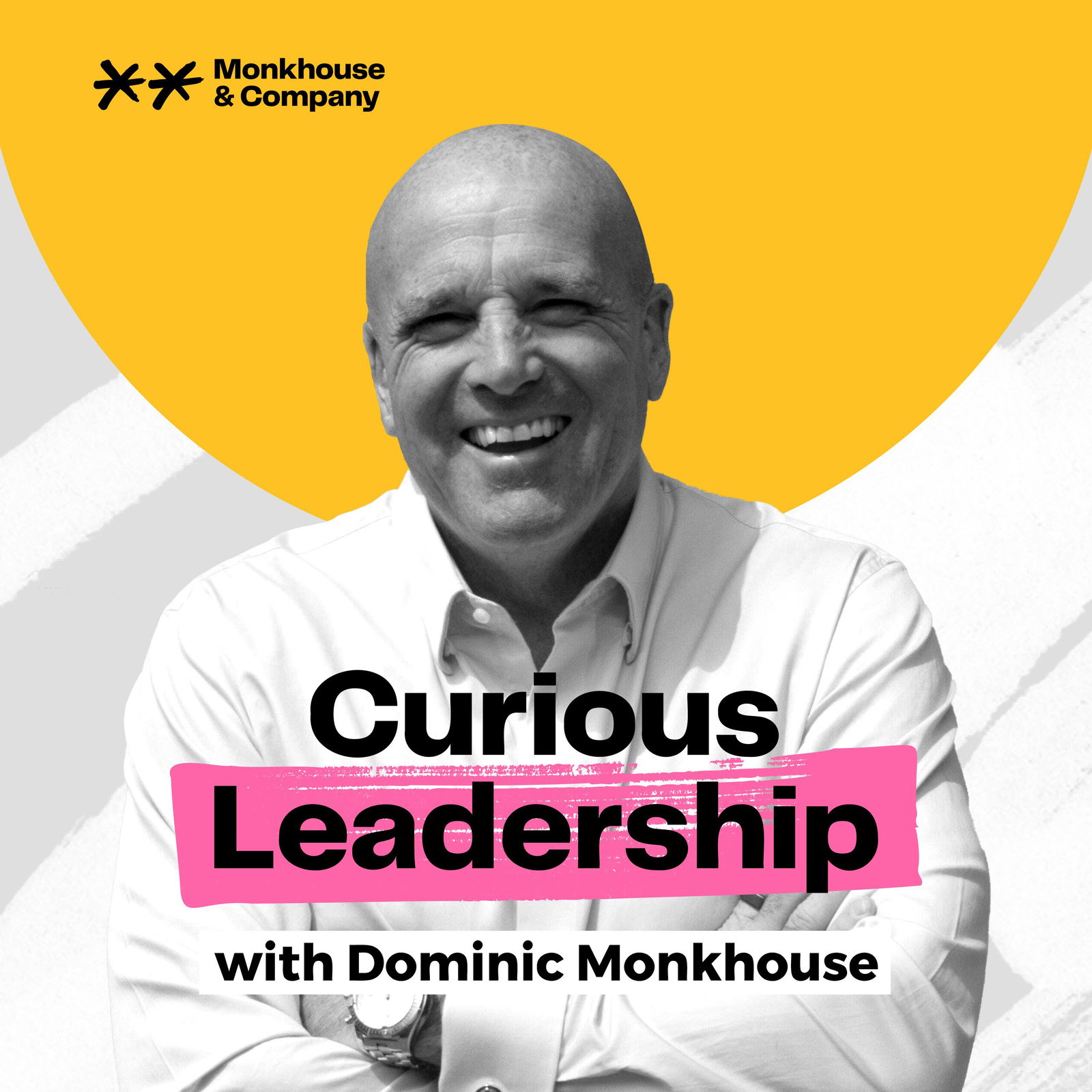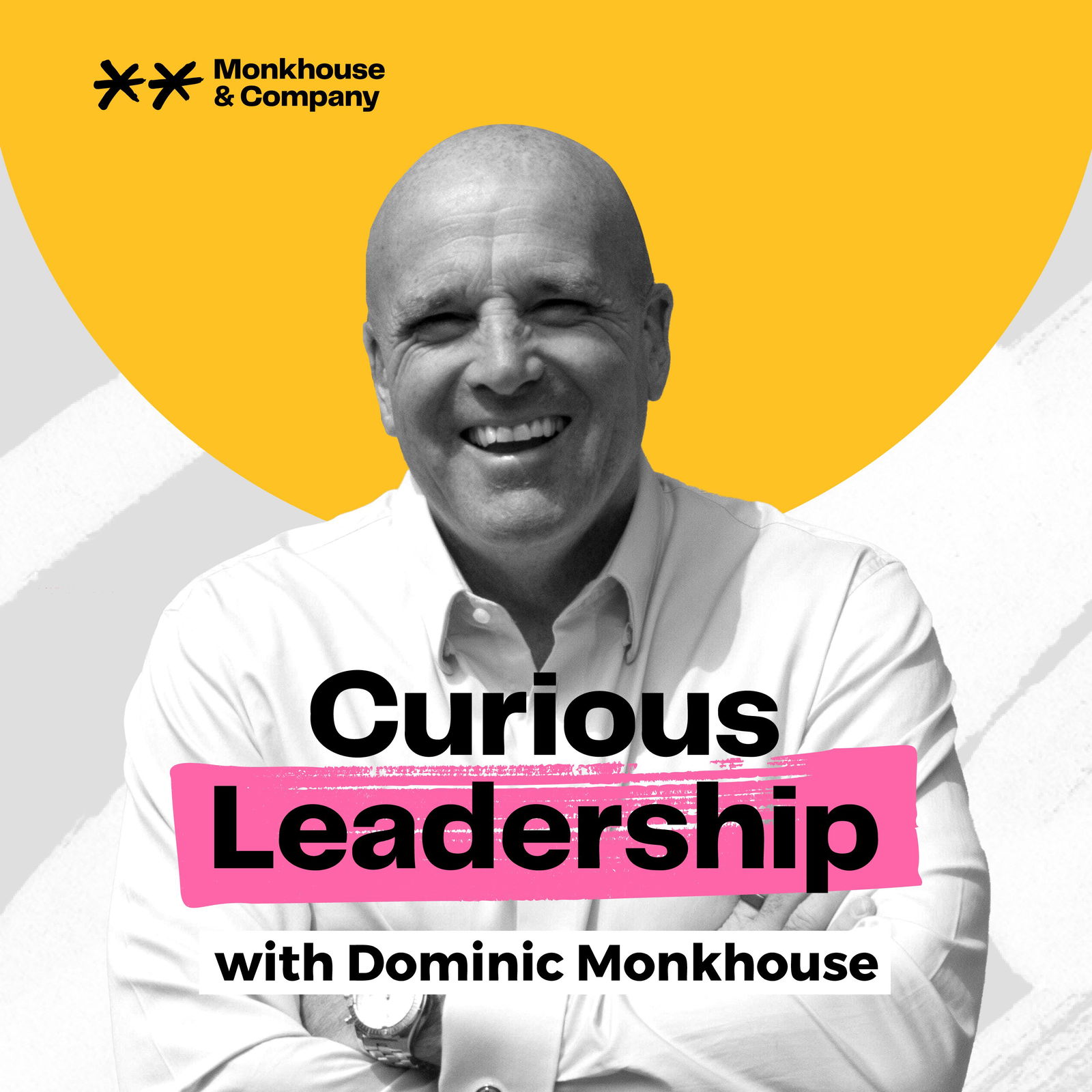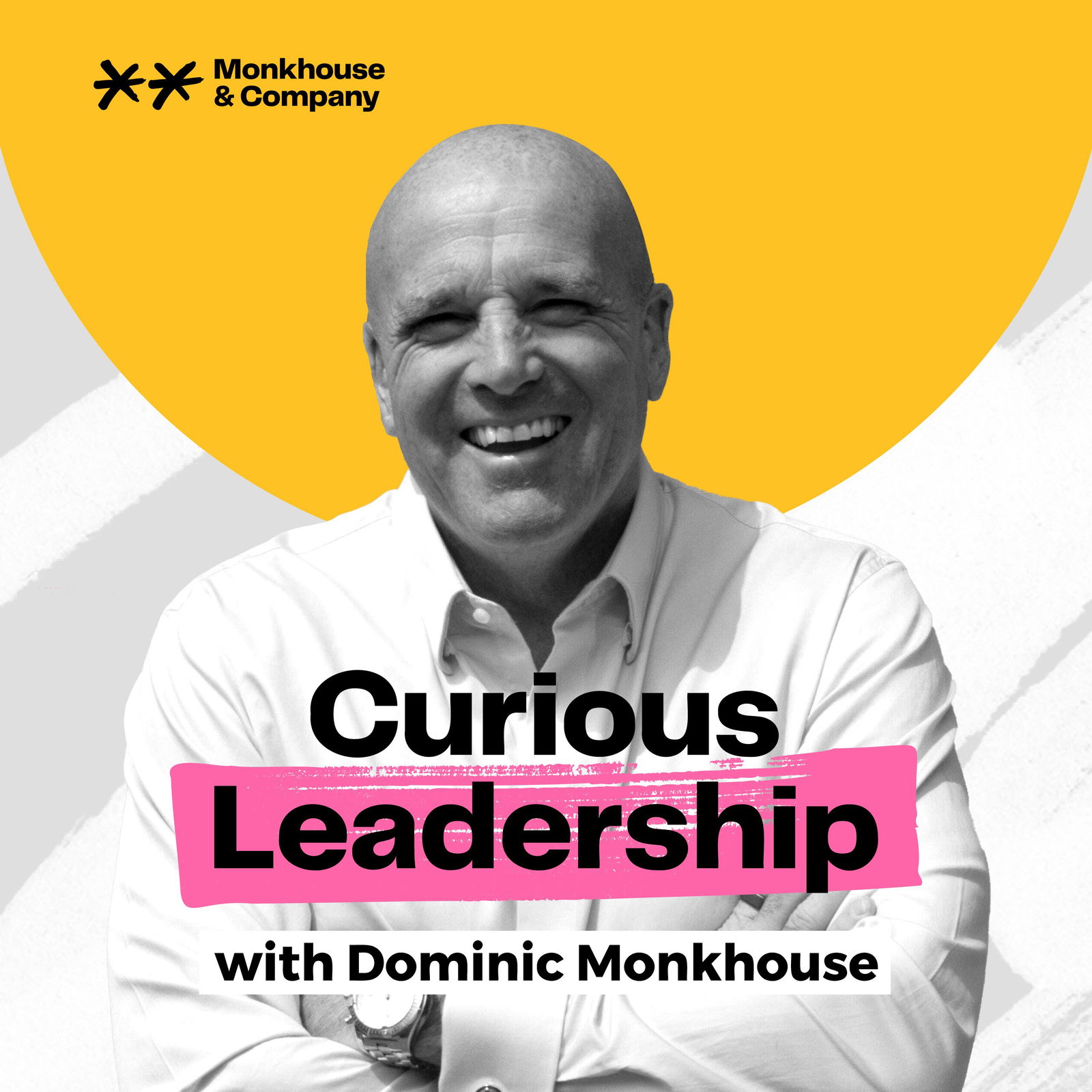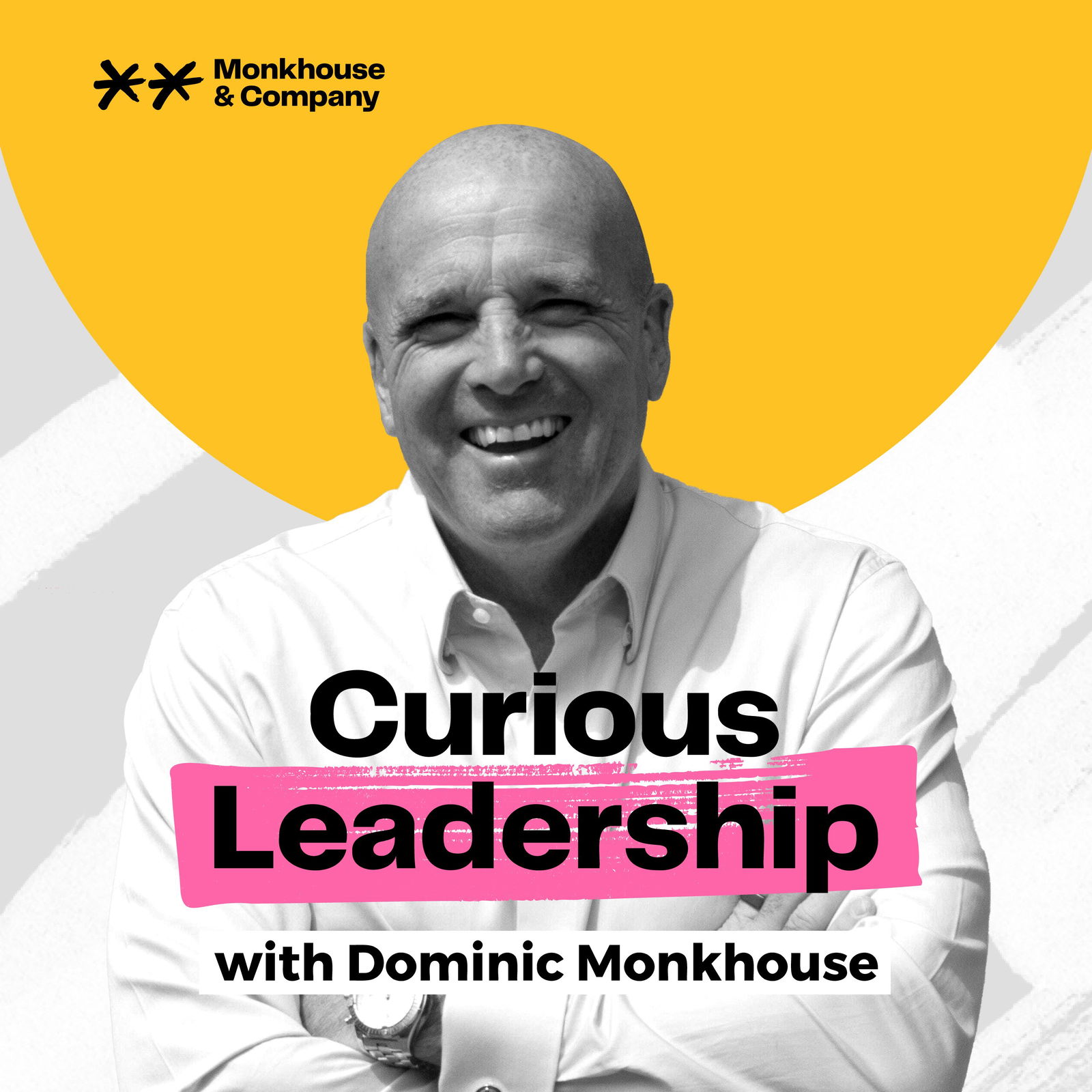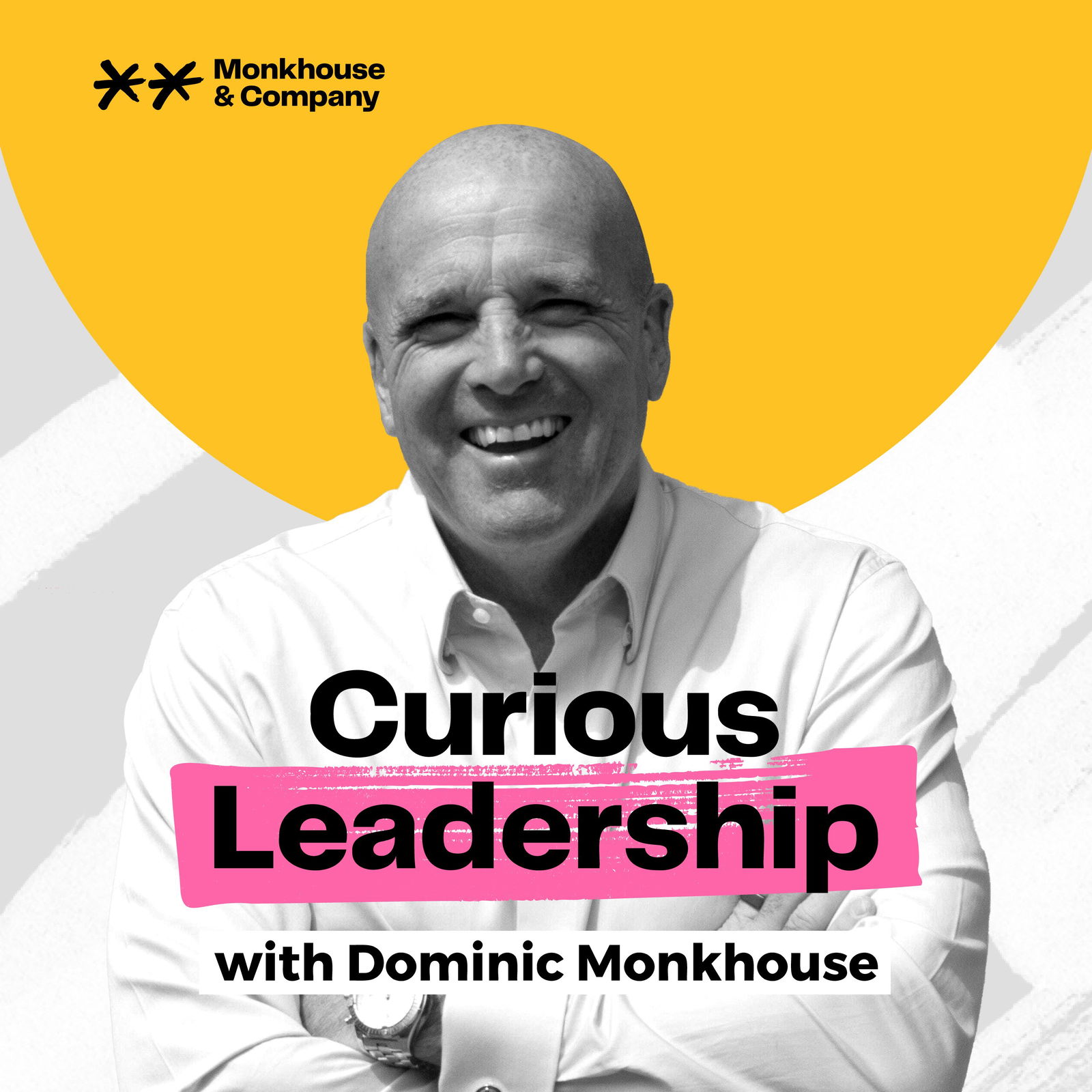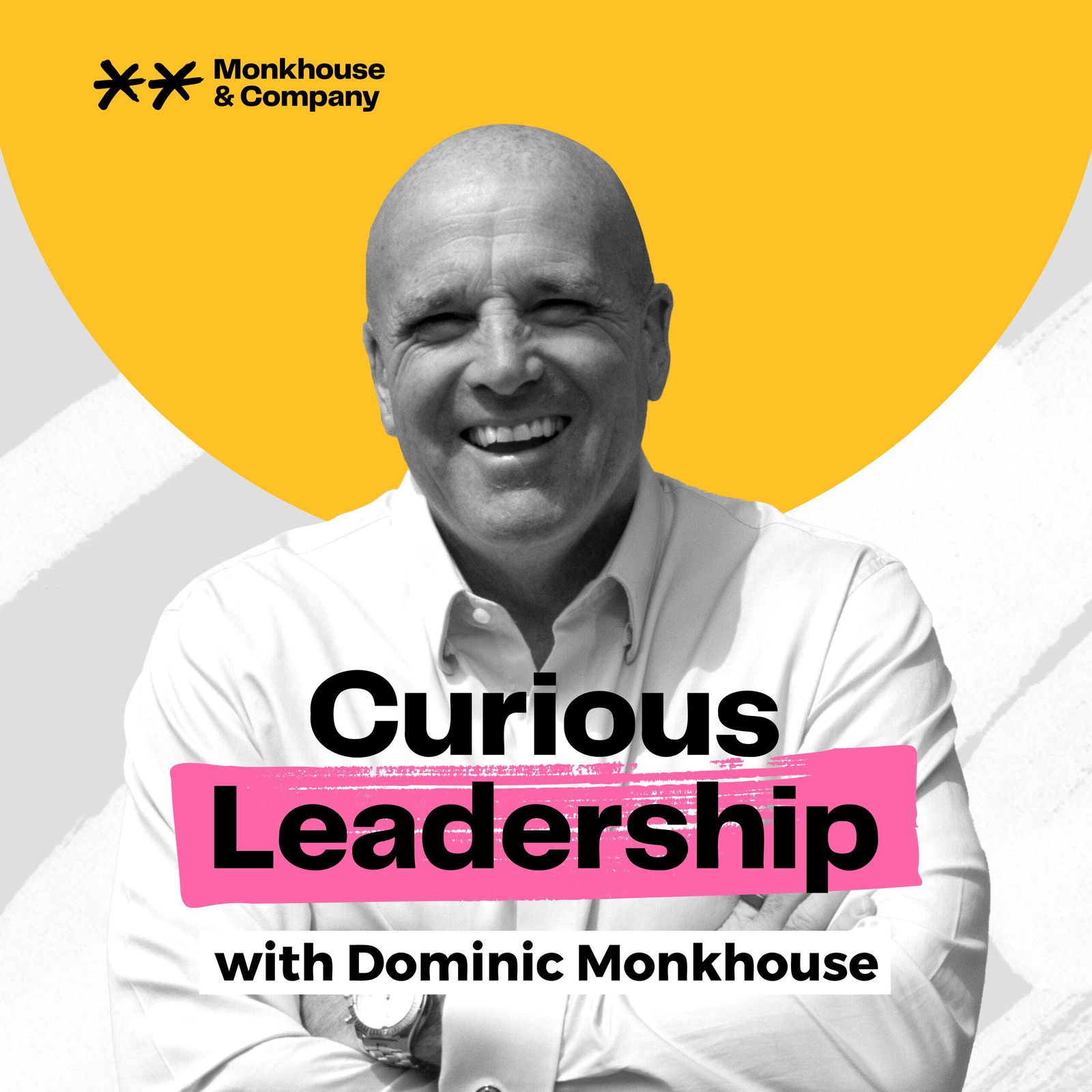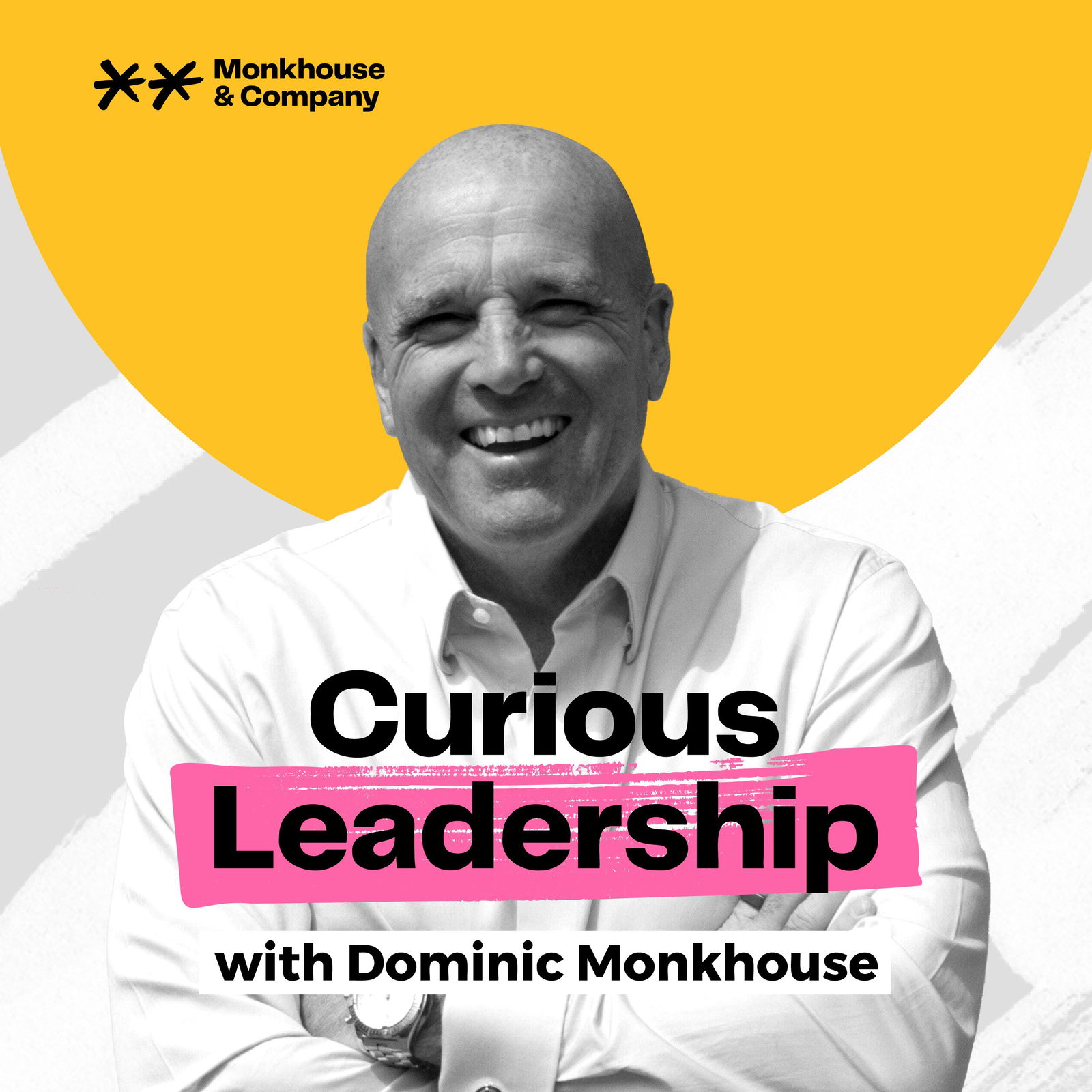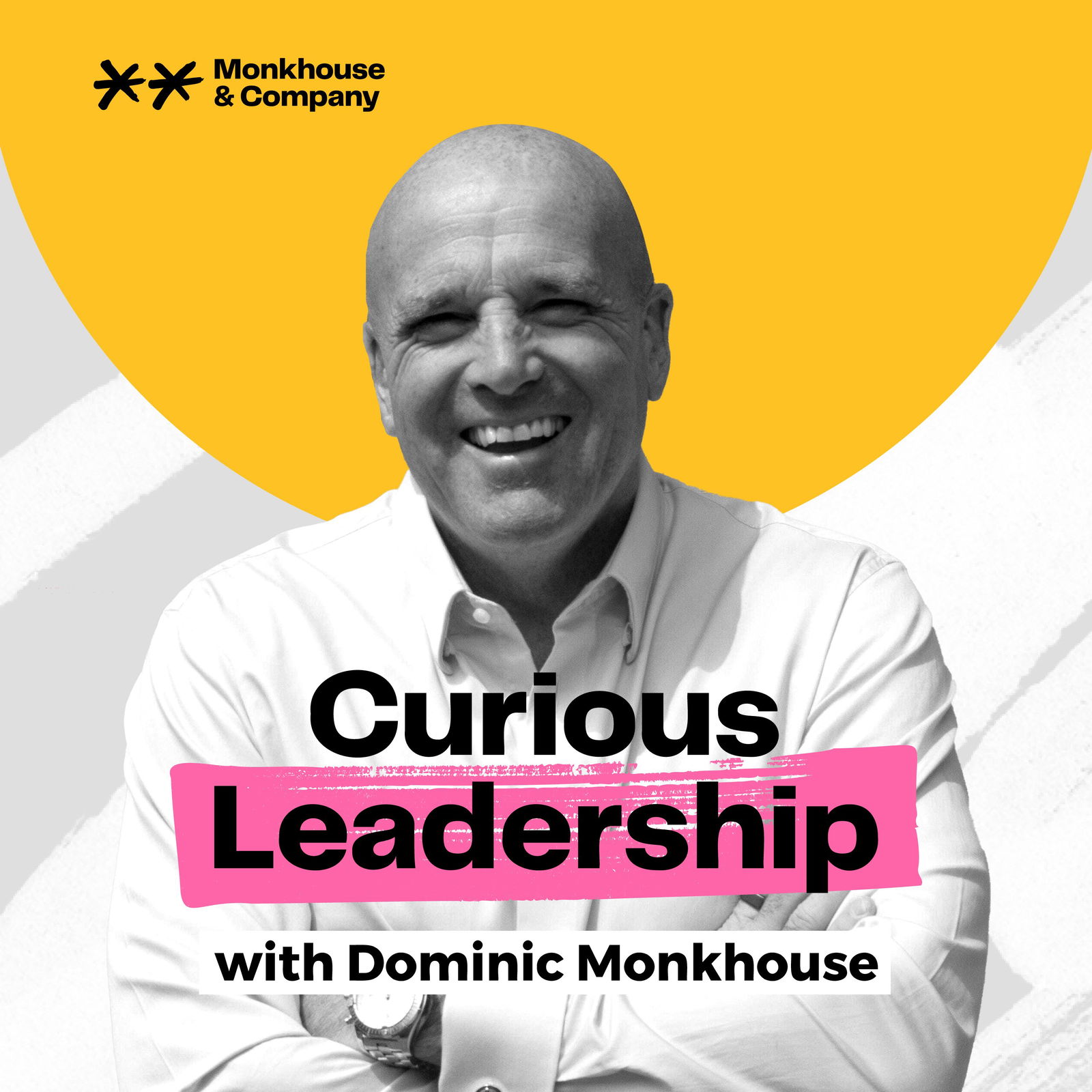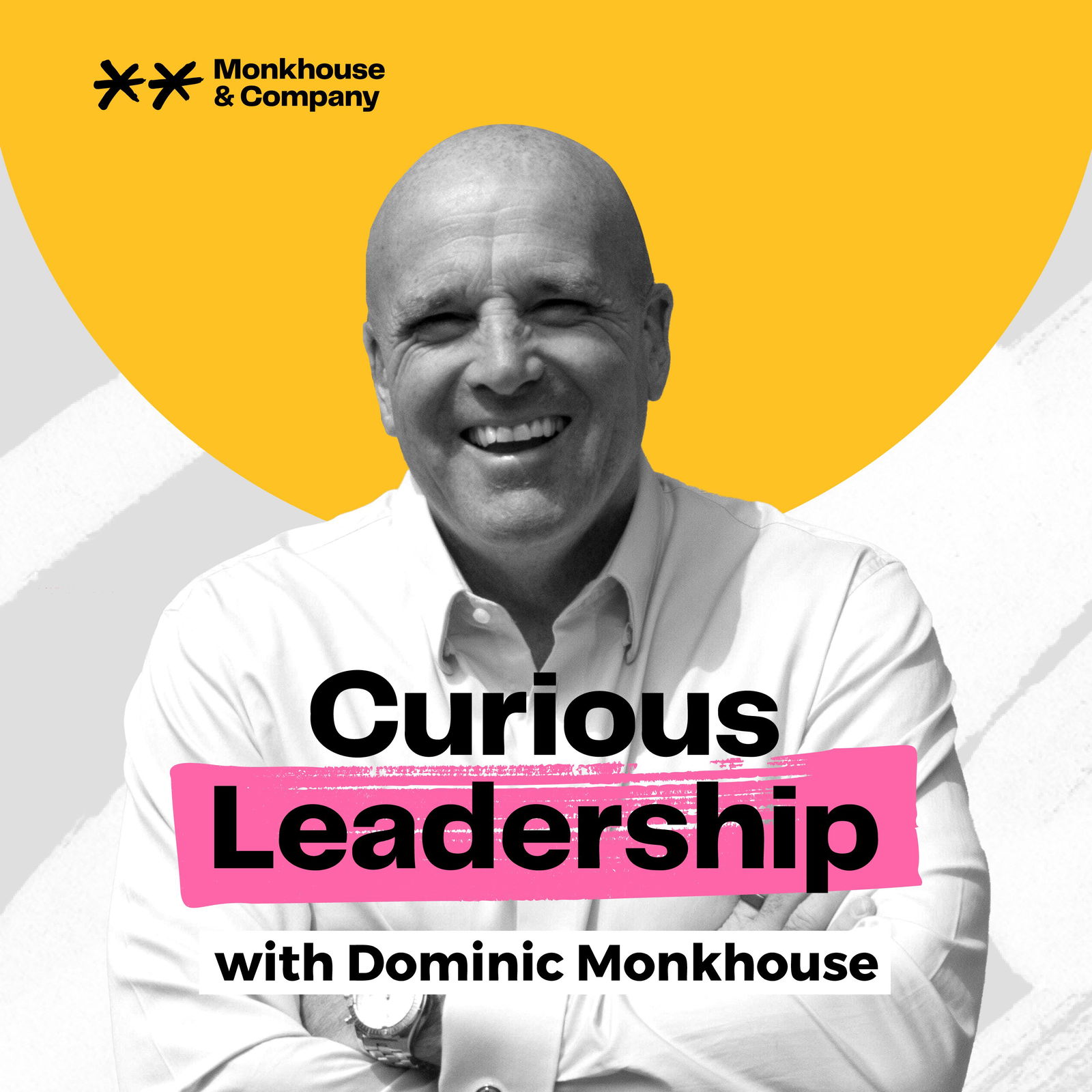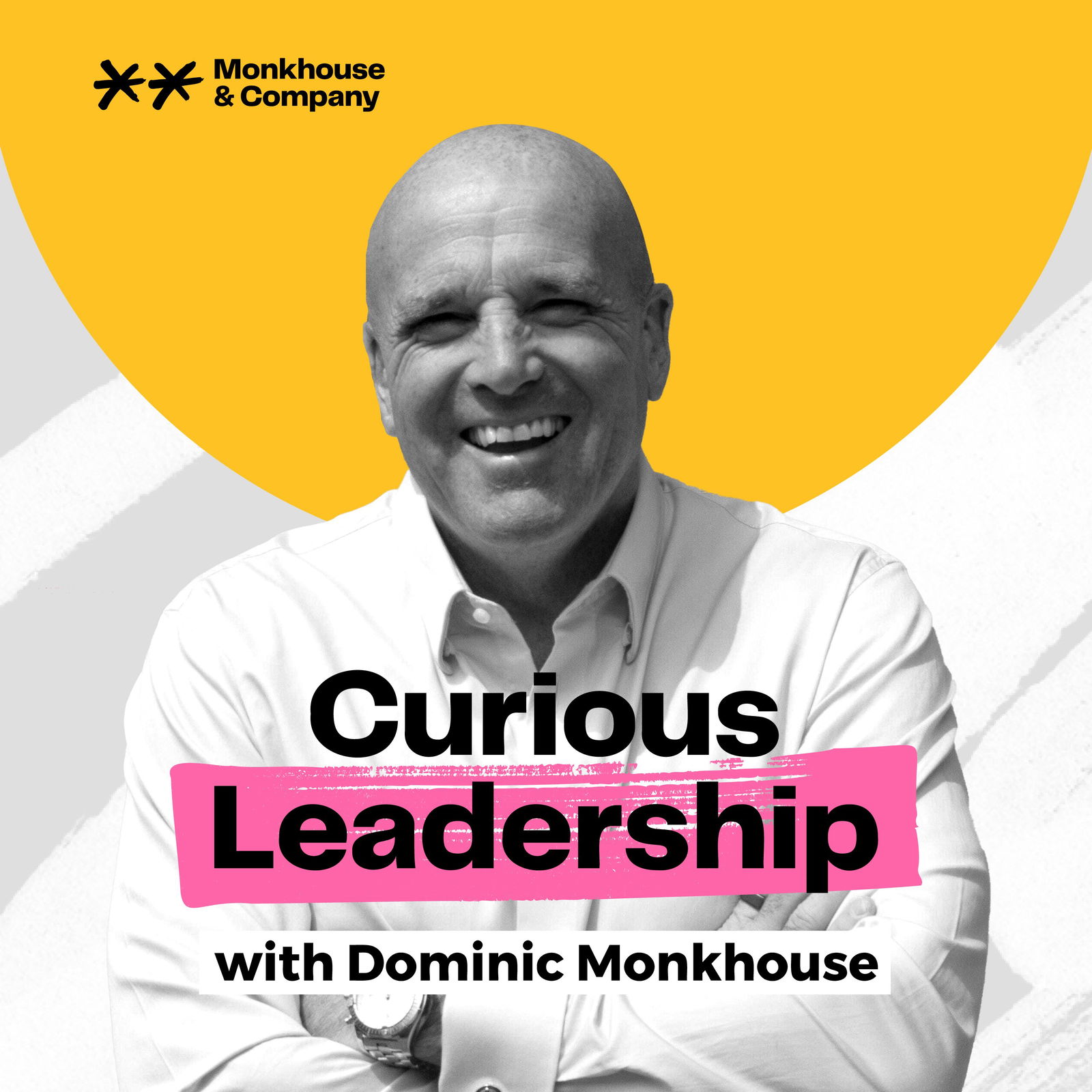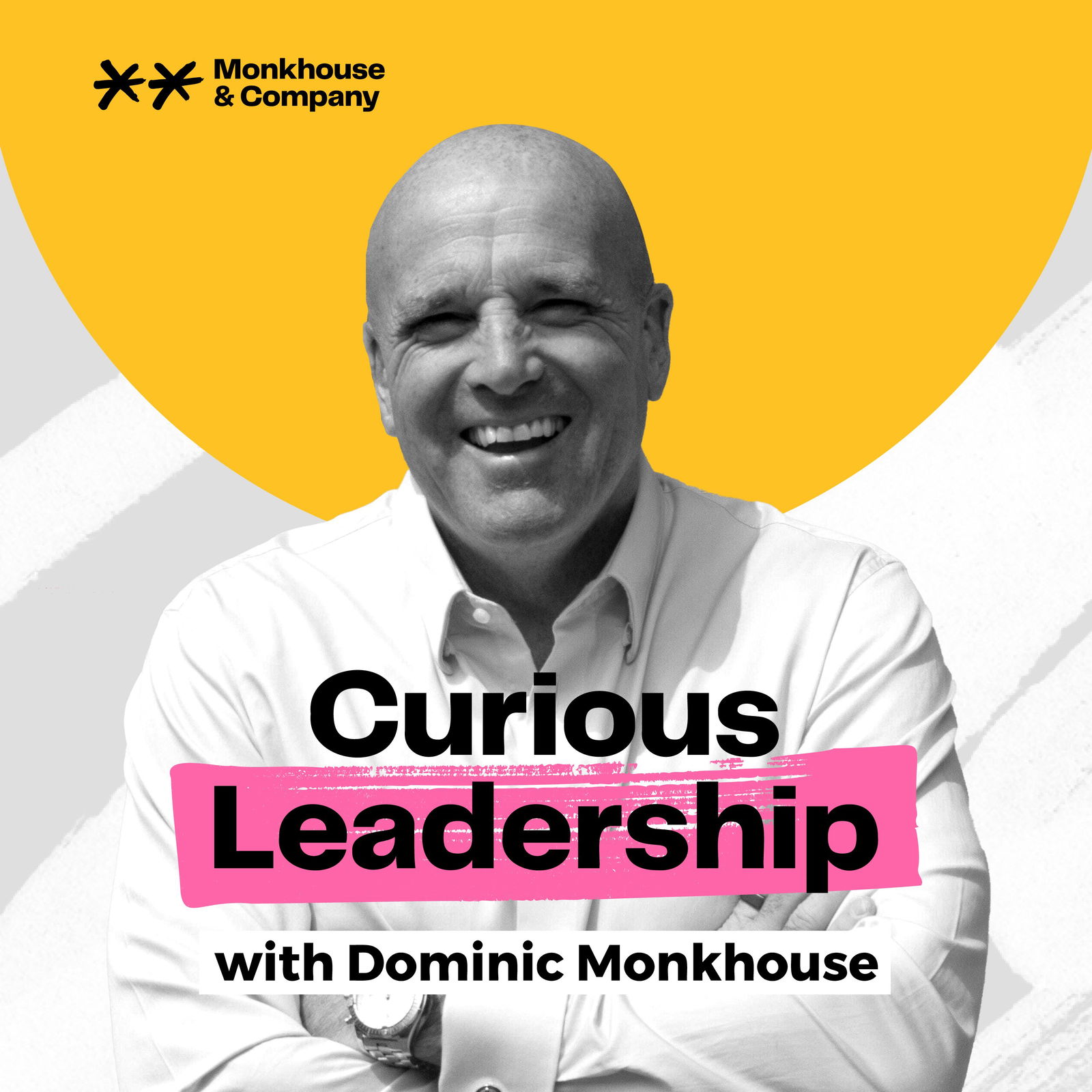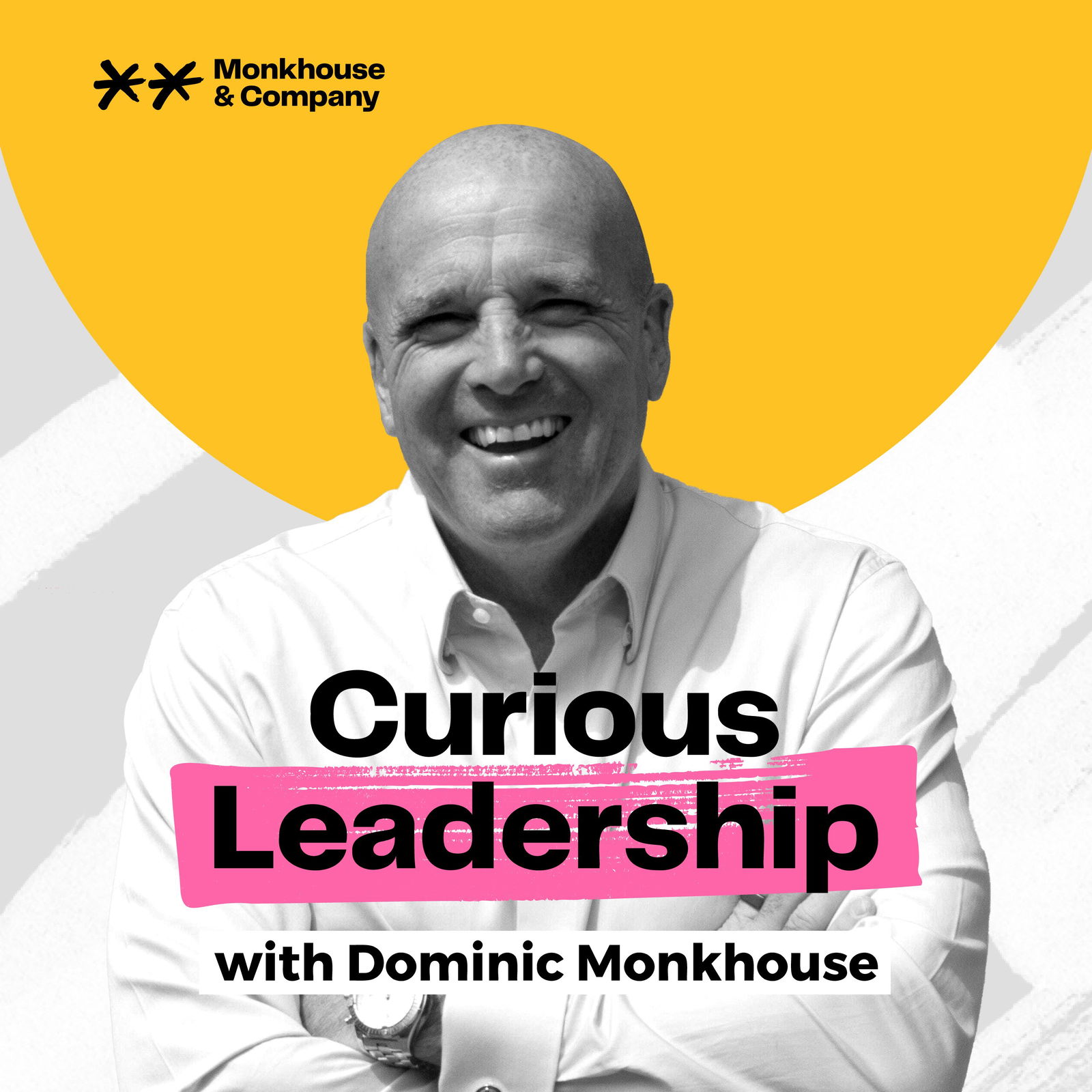Discover Curious Leadership with Dominic Monkhouse
Curious Leadership with Dominic Monkhouse

Curious Leadership with Dominic Monkhouse
Author: Monkhouse & Company
Subscribed: 44Played: 3,373Subscribe
Share
© Monkhouse & Company
Description
Do you want to dive deep into the minds of those who dare?
With an insatiable appetite for knowledge and a disdain for mediocrity, ‘Curious Leadership with Dominic Monkhouse’, is your fortnightly look into the mindsets of some of the world’s most trailblazing leaders.
From seasoned strategists and investors to pioneering entrepreneurs and experts, I’ll explore their personal journeys, unorthodox decisions, and the lessons they've learned while shaping the future.
About Dominic -
Dominic Monkhouse is the founder of Monkhouse & Company. He scaled two UK tech firms from zero to £30 million in five years, coached 10 founders to successful exits, and published two books to keep others from making the same mistakes.
He works with the 1% of founders committed to scaling—building elite teams, navigating the messy middle, and growing without drowning in chaos or losing control.
His mission is to see 200 founder-led firms scale from 50 to 250+ employees, creating 300,000 jobs and £52 billion in revenue and reshaping the UK’s business landscape.
With an insatiable appetite for knowledge and a disdain for mediocrity, ‘Curious Leadership with Dominic Monkhouse’, is your fortnightly look into the mindsets of some of the world’s most trailblazing leaders.
From seasoned strategists and investors to pioneering entrepreneurs and experts, I’ll explore their personal journeys, unorthodox decisions, and the lessons they've learned while shaping the future.
About Dominic -
Dominic Monkhouse is the founder of Monkhouse & Company. He scaled two UK tech firms from zero to £30 million in five years, coached 10 founders to successful exits, and published two books to keep others from making the same mistakes.
He works with the 1% of founders committed to scaling—building elite teams, navigating the messy middle, and growing without drowning in chaos or losing control.
His mission is to see 200 founder-led firms scale from 50 to 250+ employees, creating 300,000 jobs and £52 billion in revenue and reshaping the UK’s business landscape.
355 Episodes
Reverse
What if the secret to skyrocketing your business lies not just in sales, but in understanding your customers on a deeper level? In this episode of Curious Leadership, Dominic Monkhouse chats with James Peach, award winning speaker, investor and brand marketing expert whose portfolio includes roles at Innocent, Uber, and Vinted, about customer obsession, and how it shapes brand marketing strategies that resonate and influence buyer perceptions. James dives head first into the very essence of brand marketing, how it transcends mere promotion to become a powerful tool for problem-solving and emotional engagement. Hear how effective brand marketing can transform what customers think about a business, driving loyalty and growth, and how the greatest challenge impacting every business lies in measuring brand impact versus direct sales metrics. Discover the vital collaboration between both brand and growth teams and how clear purpose is essential for motivating employees to enhance organisational efficiency - a principle not just applicable to large corporations but impacts all businesses, regardless of size or industry. Reflecting on his scale-up experience, James shares how fast-paced decision making can dramatically influence brand perception and the importance of maintaining a customer obsession throughout the journey. James's story is not just confined to corporate boardrooms and beanbags; it crosses over into global adventures and personal growth by pushing himself to the max - 2 years of solo cycling across the world, mirroring his leadership philosophy - embrace discomfort for growth and leverage experience for success.Book recommendations:Good to Great - Jim CollinsRadical Candor - Kim ScottWhen the Dust Settles - Lucy EasthopeWhat Got You Here Won't Get You There - Marshall GoldsmithSign up to receive our weekly Curious Leadership newsletter: https://subscribe.monkhouseandcompany.comFollow us on LinkedIn: https://www.linkedin.com/company/monkhouse-and-companyhttps://www.linkedin.com/showcase/curiousleadershipSubscribe wherever you get your podcasts: https://link.cohostpodcasting.com/52495078-fc00-41b8-a42e-9371bb2fa3e0?d=sZwdKMGh4
What happens when you lead three HR tech brands through growth, acquisition, and the AI revolution? Phil Coxon is in the thick of it.In this episode, Dominic is joined by Phil Coxon, Managing Director of Breathe, Elmo UK, and RotorGeek - three HR and workforce management platforms tackling different ends of the market.Phil shares what he’s learned scaling global businesses like Criteo and Mindbody, and how he’s now applying those lessons in the world of SME and enterprise HR software. From sales strategy and product orchestration to company culture and AI integration, this episode dives deep into what it takes to lead through disruption and transformation.Phil also discusses how Breathe is deploying Gemini AI internally, how they’re navigating shifting regulation, and why whiteboard sales still beat PowerPoint pitches every time.Scaling Across Markets: How Phil navigates leading three brands (Breathe, Elmo UK, and RotorGeek) that serve wildly different customer profiles—from micro-SMBs to global enterprises.Whiteboard Sales Magic: Why abandoning PowerPoint in favour of live co-creation on a whiteboard leads to the most memorable and successful sales pitches.The AI Assistant Mindset: How Breathe is embedding Gemini into daily workflows, from sales to implementation, and why every employee is encouraged to spend an hour a day with AI.Security and Trust in AI: The rigorous compliance approach Phil takes to integrating AI in HR—where data sensitivity is non-negotiable.Driving Sales Without Demand: Why great sales today means educating customers who weren’t planning to buy—and how regulation is helping create urgency.From IPO to Impact: Phil’s reflections on scaling Critéo from $30M to $2.3B, leading teams in Manhattan and across the globe, and what stuck with him.Cultural Synergy After Acquisition: Lessons in merging different business cultures without breaking what works—from emergency ward scheduling to HR platforms.Mandatory Training Saves Lives: How small steps like cyber security and equality training aren’t just box-ticking—they can protect 147-year-old companies from collapse.The Fast-Follow Product Strategy: Why speeding up the delivery of customer-requested features is Breathe’s north star—and how AI-generated code will make it happen.Phil Coxon is the Managing Director of Breathe, Elmo UK, and RotorGeek. With a background in global SaaS, adtech, and scaling tech companies, Phil now leads a suite of HR products focused on small businesses through to large-scale enterprise clients.Key Topics Covered:Why culture is the key to post-acquisition successHow AI is supercharging sales, engineering, and implementationWhat it takes to sell HR tools to buyers who aren’t lookingThe future of engineering with code-generating AIWhy clarity beats complexity in modern leadershipWhere to Find Phil:LinkedIn – Phil Coxon📚 Book Recommendations from PhilThe 7 Habits of Highly Effective People by Stephen R. CoveyThe Underground Railroad by Colson WhiteheadDark Matter by Blake Crouch--------Sign up to receive our weekly newsletter:https://subscribe.monkhouseandcompany.comFollow us on LinkedIn:https://www.linkedin.com/company/monkhouse-and-companyhttps://www.linkedin.com/showcase/curiousleadershipSubscribe wherever you get your podcasts: https://link.cohostpodcasting.com/52495078-fc00-41b8-a42e-9371bb2fa3e0?d=sZwdKMGh4
Ivo Dimitrov is co-founder and Chief Venture Officer at Finum, a neobank and financial solutions provider for SMEs and freelancers across Europe. Previously serving as CPO for five years, Ivo transformed his role to focus on high-risk, high-reward products, particularly AI accounting solutions. Before Finum, he co-founded a startup incubator (before the term existed) that launched hundreds of products, including the successful Modul Bank, now a top-three fast-growing SME bank in Russia. Based in Berlin, Ivo brings over a decade of fintech and product development experience to building the future of AI-powered business tools.SummaryIn this episode, Dominic explores the evolution from traditional product management to venture-focused innovation with Ivo, who's pioneering AI accounting solutions that promise to revolutionise how SMEs handle their finances. From his unique "Chief Venture Officer" role to the strategic decision to orchestrate rather than build AI models, discover how Finum is creating proactive AI agents that handle accounting tasks automatically while ensuring human oversight and trust.The conversation delves into the psychology of AI adoption, the importance of conversational UI design, and why the future belongs to companies that can integrate seamlessly into emerging AI platforms rather than compete with them. Ivo shares hard-won lessons from launching AI products in regulated industries and explains why "storytellers" are more valuable than ML engineers in today's AI landscape.DiscoverOrchestration Over Creation: The biggest mistake AI companies make is trying to build their own models instead of orchestrating existing foundation models from OpenAI, Anthropic, and Google. Time-to-market and adaptability are more crucial than proprietary technology.The Storyteller Role: Success in AI products requires "storytellers" - people who can explain complex requirements to AI models in simple terms. This skill is more valuable than traditional ML engineering for most AI applications.Conversational UI Revolution: The future of software interfaces isn't traditional buttons and forms, but enriched conversational experiences that dynamically present the right UI elements based on context and user requests.Proactive vs Reactive AI: The most valuable AI products don't wait for user requests - they proactively identify opportunities, send reminders, and take action, requiring only verification rather than instruction from users.Platform Integration Strategy: As AI platforms like ChatGPT become dominant, success will come from seamless integration rather than platform competition. Think App Store dynamics rather than trying to build competing ecosystems.Trust Through Transparency: AI adoption in high-stakes domains like accounting requires insurance backing, clear reasoning explanations for every decision, and the ability for users to easily override AI choices when needed.The Psychology of AI Acceptance: Humans apply zero-tolerance standards to AI errors while accepting much higher error rates from humans. Overcoming this requires strategic trust-building and demonstrable value delivery.European Market Complexity: Despite appearing unified, Europe requires country-specific approaches - Germans spend 12-17 minutes reading terms and conditions that French users skip through in 7-10 seconds, fundamentally affecting product design and adoption strategies.Connect with Ivo- https://www.linkedin.com/in/millt/Book RecommendationDominic’s book Mind Your F**king Business is out nowSign up to receive the weekly newsletter: a...
Dr. Jon Finn wrote his best-selling book ‘The Habit Mechanic’ (which took him over 20 years) because his life’s mission is to help people to be their best in the challenging modern world.He founded the award-winning Tougher Minds consultancy and has three psychology-related degrees, including a PhD. He has worked in performance psychology, resilience, and leadership science for over 20 years. He also writes regularly for Forbes.Tougher Minds uses cutting-edge insights from psychology, behavioural science, neuroscience, and world champions to help organisations develop “Habit Mechanics” and “Chief Habit Mechanics”—resilient people, outstanding leaders, and world-class teams.Having trained and coached over 10,000 people, Dr. Finn, and his colleagues, work with global businesses, high-growth startups, individuals, elite athletes, coaches and teams, leading educational institutes, families, the UK government, and think tanks.In this episode, Dominic explores AI's impact on the workforce and the journey of integrating AI into behavioural science and habit formation. Inspired by Geoffrey Hinton's work on neural networks, learn how blending traditional methods with cutting-edge AI enhances understanding of brain function and behaviour. Dr. Jon shares the concept of brain states - recharge, medium-charge, and high-charge - and how AI can revolutionise workflows by automating routine tasks and co-working with humans on complex tasks. Looking forward, we explore the concept of creating high-performing human-AI teams, guiding individuals and businesses toward harmonious collaborations with AI, enabling unprecedented speed and efficiency in achieving goals.DiscoverAutomatic Thinking: Human thoughts and behaviours are largely driven by automatic or semi-automatic processes. This is influenced by biases and past experiences, which affect the ability to generate truly conscious and unbiased ideas.Emotional Regulation in Athletes: In elite sports, the ability to regulate emotions plays a pivotal role in determining whether young athletes maintain or lose their professional status as they age.Effort and Performance: Sustained success in any field relies on consistent effort, ongoing learning, and the ability to perform effectively under pressure, particularly in challenging or high-stakes situations.Training Gaps in Mental Performance: While athletes typically receive extensive training in physical, technical, and tactical aspects, they often lack structured training on understanding and improving their cognitive and emotional processes.Risks from AI in the Workplace: AI is disrupting workplace roles that involve medium-energy tasks, and people unable to adapt or up-skill are at risk of being replaced. Emotional regulation and the ability to shift to higher-performance states are critical for adapting to these changes.
Paulo Savaget is Associate Professor at University of Oxford’s Department of Engineering Science and Saïd Business School. He holds a PhD from the University of Cambridge as a Gates Scholar and has a background working as a researcher, consultant, and entrepreneur, finding innovative solutions for a more inclusive world. His research covers the mechanics of entrepreneurship through a 'systems lens' and with a special focus on large-scale socioenvironmental issues (poverty, climate change, and global value chains etc). He has a particular interest in working with practitioners to find and explore solutions for systemic problems in situations where resources are scarce, stakes are high, and time is short.In this episode, Dominic learns how “scrappy organisations” tackle complex problems through innovative strategies such as piggybacking on existing systems and navigating loopholes in regulations. With Paulo explaining the importance of systems thinking and unconventional approaches to problem-solving. Hear about how businesses can navigate regulatory landscapes, repurpose technology, and leverage self-reinforcing behaviours to create effective workarounds. Paulo advocates innovation, resourcefulness, and adopting a scrappy mindset in addressing complex problems for individuals and organisations.DiscoverResourceful and Unconventional Problem-Solving: Creative solutions can be achieved by thinking outside the box and using limited resources in innovative ways to overcome complex challenges. Hacking Systems for Impact: Significant change can occur by finding innovative ways to navigate or bypass existing systems and challenges, much like hackers do in their domains. Holistic Solutions through Systems Thinking: Looking at problems as part of interconnected systems rather than isolated issues enables more comprehensive and effective problem-solving. Inspiration from Scrappy Organisations: Resource-constrained businesses and organisations demonstrate how leveraging opportunities like loopholes and existing systems can lead to remarkable success. Innovation Without Large Budgets: Success can lie in strategic thinking, resourcefulness, and ingenuity, proving that high impact doesn’t always require massive financial resources.Book recommendations:Hans Rosling - FactfulnessAdam Grant - OriginalsPaulo’s book The Four Workarounds is out nowDominic’s book Mind Your F**king Business is out now
Can AI revolutionise the way your business operates, or even redefine entire industries?This special episode of Curious Leadership was recorded as a live panel at the CEO Summit 2025, where Dominic was joined on stage by guests Neil Marley, Kevin Bradley, Pedro Arriaga, and John Readman to explore how AI is driving business productivity and innovation across various sectors. Neil reveals how Neologik pivoted from its roots in training technologists to harnessing AI for document automation, a strategic shift mirroring the evolving job market. Kevin brings a unique perspective on Omegro's strategic growth within Constellation, while Pedro shares how AI has supercharged productivity at his facilities management platform, Pego. John shares insights on AI's transformative role in digital marketing, moving beyond predictive analytics to empower data-driven decision-making at Modo25.Our panellists offer their perspectives on how businesses can navigate the challenges and opportunities presented by AI, balancing the human role of integrating it into teams, and how to align employee mindsets with technological advancements. Hear about the rapid evolution of software development and how agile methodologies can accelerate innovation, including advice on overcoming tech debt, enhancing user interaction through voice prompts, and the competitive edge offered by quick MVP development and AI-driven platforms. As AI continues to shape industries, we explore the need for education to prepare the next generation with skills in question formation, philosophy, ethics, and domain-specific expertise.
Elaine Jobson is a dynamic CEO, board director, and culture strategist with over 30 years of experience scaling fitness and wellness brands across Australia, Africa, Asia, and Europe. As CEO of Jetts Fitness, she spearheaded the Management Buyout (MBO), restoring the brand to private ownership and founder-driven leadership. Under her guidance, Jetts has flourished, expanding into new markets and repositioning for sustainable, high-performance growth. Elaine’s passion for values-driven, high-performing cultures is at the heart of her leadership philosophy. Her book, High Performance Through Happy People, captures her insights on building thriving teams that deliver exceptional results. A sought-after keynote speaker, Elaine energises audiences at industry conferences, leadership summits, and corporate events, sharing expertise on leadership, culture strategy, franchising, and team performance. Known for her sharp operational and commercial acumen, Elaine is a proven leader in strategic growth, franchising, and culture transformation - making her one of the most impactful figures in the industry today.In this episode, Dominic uncovers how the implementation of a Net Promoter Score (NPS) should be a business philosophy rather than just a survey. With Elaine providing insights on identifying detractors through customer feedback, the importance of delivering what she calls “brilliant basics”, and the significance of empowering her club managers and staff to enhance customer service to create a positive culture. Elaine also shares the rapid growth and expansion of the Jetts Fitness brand, their franchise model, commitment to good profit, the evolving perception of fitness as a means for mental health, and looks ahead at opportunities in the global fitness market, particularly in emerging territories like India.DiscoverHow Leadership Drives Growth: Strong leadership is essential for managing growth, stabilising operations, and adapting to changing business environments.How to Build a Positive Culture: A happy, engaged workforce leads to higher performance and better organisational outcomes. Culture is a key driver of long-term success.How Metrics Can Improve Performance: Tools like customer satisfaction scores provide valuable insights and help businesses refine their services to meet customer needs, fostering loyalty.Opportunities in Emerging Markets: Expanding into new markets with growth potential requires strategic planning, market understanding, and partnerships to capitalise effectively.How Scalable Business Models are Key: Structuring businesses to scale - for instance, through franchising or other replicable models - enables sustainable growth and adaptability across regions.Book recommendations:Elaine’s book High Performance Through Happy People is out nowDominic’s book Mind Your F**king Business is out now
Joseph Michelli is an internationally sought-after speaker, author, and organisational consultant who transfers his knowledge of exceptional business practices in ways that develop joyful and productive workplaces with a focus on customer experience. His insights encourage leaders and frontline workers to grow and invest passionately in all aspects of their lives.A Wall Street Journal, USA Today, Publishers Weekly, Nielson BookScan, and New York Times #1 bestselling author. Joseph’s most recent book, All Business Is Personal, features proven strategies for boosting customer loyalty, engagement, and sustainable growth, and offers insights leaders can apply across industries to create high-performing, customer-focused organisations.Joseph holds the Certified Speaking Professional designation from the National Speakers Association (NSA). He is a member of the Authors Guild, an editorial board member for the Beryl Institute's Patient Experience Journal (PXJ), and is on the founders' council of CustomerExperienceOne. Other achievements include winning the Asian Brand Excellence Award and being named as one of the Top 10 thought leaders in Customer Service by Global Gurus. He received his master's and doctorate from the University of Southern California.In this episode, Dominic explores the intersection of AI and human interaction, questioning the ability of AI to replicate genuine human care and creativity, and the complexities of customer experience, loyalty, and referrals. With Joseph advocating the necessity for CEOs to be passionate and unreasonable in their pursuit of exceptional customer service. He explores strategies for activating referrals, the importance of emotional engagement, and the design of customer journeys that foster loyalty. Joseph shares his insights on the transformation of patient experience in US healthcare, and the innovative approach that led One Medical to being acquired by Amazon. Emphasising the importance of redesigning processes to enhance care delivery, he highlights the cost reduction achieved through proactive health management and the role of technology in creating human-centric services. DiscoverThe Power of Emotional Connection in Business: Building an emotional connection with customers, beyond merely offering a product or service, fosters loyalty and helps establish a strong brand identity.The Importance of Customer Experience: Exceptional customer experience can significantly impact a business's success. By fostering emotional connections and going beyond basic transactional value, businesses can create loyalty and referrals among their customer base.Word-of-Mouth as a Powerful Marketing Tool: Customer referrals play a crucial role in business growth. Companies that focus on delivering exceptional experiences often benefit from organic word-of-mouth promotion, resulting in reduced sales and marketing costs.Balancing Cost-Cutting with Customer Experience: While reducing costs is a strategy some businesses consider, focusing solely on cost can lead to commoditisation. Prioritising customer experience and value can differentiate a business and create long-lasting success.The Influence of Net Promoter Score (NPS): Net Promoter Score is a useful metric for understanding customer loyalty and satisfaction. By asking customers how they found the business, insights can be gained that highlight the importance of customer recommendations and the overall impact of positive experiences.Book recommendations:Joseph’s book
James Dawson and Richard Doherty are seasoned professionals from the fintech and financial services industries, each bringing decades of expertise to their respective fields.James Dawson, founder of Humble Technology, has over 21 years of experience in fintech. His career has been dedicated to addressing and overcoming the challenges fintech startups face in sales. James believes that many fintechs fail not due to a lack of funding but because they rely too heavily on relationship-driven sales rather than employing proven, science-backed methodologies. As a former Head of Europe at OpenFin, a leader in desktop interoperability, James successfully built high-performing teams and developed his own sales techniques. To share his strategic insights, James created the Fintech Sales FastTrack programme - a framework designed to help startups establish predictable and scalable revenue systems. In addition to his fintech achievements, James also owns Humble Grape, a wine bar and merchant that imports high-quality wines from 600 small vineyards across 22 countries, exemplifying his entrepreneurial versatility.Richard Doherty, meanwhile, leads the technology practice for Asset & Wealth Management at Publicis Sapient, a prominent consultancy in financial services and digital business transformation. With over 20 years of experience in technology and financial services, Richard specialises in helping firms align their technological initiatives with business strategies. His expertise lies in implementing large-scale technological changes, including system overhauls, data transformations, and technology-focused innovations. Richard advises business leaders on building future-ready operating models that leverage technology to drive innovation, generate revenue, cut costs, and mitigate risks. By collaborating with both business and technology stakeholders, Richard fosters alignment that enables firms to ensure sustainable and expedited transformation in highly competitive markets.Together, James and Richard exemplify leadership and innovation in their fields, uniting expertise in sales strategy, technology, and enterprise transformation to shape the future of fintech and financial services.In this episode, Dominic explores methodologies used by founder-led sales to scalable sales operations. Learning that in the early stages of business development, a relentless focus on an initial product offering is essential. For example, for Amazon it was books and for Google it was search functionalities - even though their objective was expansion and market domination. With James and Richard emphasising the importance of aligning sales strategies with marketing efforts, they encourage leaders to nurture a growth-oriented mindset among sales personnel. Hear their insights on the complexities of building successful sales engines that can withstand the rigours of today's competitive landscape.DiscoverBusiness Growth and Focus: Successful companies often start by focusing on a single, straightforward offering before expanding into larger and more complex operations. This focus is essential in the early stages to build a sustainable foundation.Sales Transition Challenges: Transitioning from founder-led sales to scalable, enterprise-level sales processes is a significant challenge for businesses, especially in the fintech sector. It requires a particular skill set and mindset to scale sales effectively from small to large operations.Collaborative Expertise: Leveraging the collaboration of industry experts with diverse professional backgrounds, such as consulting and financial services, can help scale businesses by addressing complex challenges and driving transformation.The Importance of...
Mike Hicks' connection to investing in mid-market companies dates back to 1994, when he worked at the EBRD, contributing to the creation of the first private equity fund in Romania. After overseeing a joint venture between Creditanstalt Investment Bank and Advent International, he developed a keen interest in enhancing investor-management interactions, dedicating over 20 years to this pursuit.In 2010, Mike founded Catalysis, following several years of leading a similar practice at Grant Thornton. With the support of skilled colleagues, he has managed over 375 projects since the company's inception, Mike advocates the importance of coachability and partnership in navigating the complex landscape of mid-market firms.In this episode, Dominic explores the myths and realities of private equity as Mike dismantles common misconceptions about management and investment partnerships. Highlighting the nuanced dynamics between investors and business leaders, he explains that in smaller companies, collaboration often trumps the fear of management changes. Discover The Role of Private Equity in Business Growth: Private equity plays a crucial role in providing funding for businesses, particularly those lacking tangible assets for traditional bank loans, such as tech companies. It serves as an alternative to the UK's shrinking bank funding market by offering equity, facilitating business growth, and providing management teams a pathway to personal wealth.Misconceptions About Private Equity: Management teams often face misconceptions about private equity investment. Some assume operations will continue unchanged, while others fear losing control to investors. In truth, investors aim to add value and collaborate for improvements without seizing control of the business.Team and Organisational Alignment: Aligning the management team’s capabilities with the business's needs is crucial. This match depends on the business model's complexity, market conditions, and growth goals. Businesses often require guidance to optimise their leadership teams to effectively meet these demands.Governance and Strategy in Management: Effective governance should balance strategy formulation and operational execution without overwhelming management. Boards should prioritise maintaining this balance to ensure alignment with value creation rather than focusing solely on financial oversight. Keeping boards small and focused helps avoid operational inefficiencies.Mistakes in Scaling Businesses with Private Equity: Common mistakes in scaling businesses post-private equity deal include neglecting due diligence insights, misunderstanding strategy, underestimating organisational inertia, confusing change activity with results, hastily making key personnel decisions, and suffering from unbalanced governance. Avoiding these pitfalls is essential for the success of private-equity-backed ventures.Higher Multiples with Demonstrated Scalability: Businesses that can demonstrate scalability, such as sustainable growth and robust operational capacity, are more likely to attract higher multiples and favourable responses from investors during deals, highlighting the importance of long-term strategic planning.Book recommendations:Rory Sutherland - Alchemya...
Kat Thorne is a positive habits international keynote speaker, teacher and consultant. Her life story of workaholism, breakdown and burnout inspires global audiences to make one small habit change. Former Global Commercial Director & CEO, after losing everything in 2016 due to a health scare, she had no choice but to start again. Kat now works with organisations, leaders and individuals around the world to create one small positive habit change that actually results in increased well-being & resilience. Kat says “Burnout, anxiety, and stress are at an all-time high. People are the most important asset. The better people look after themselves, the better they perform in all areas of life. The result? A healthier, happier and high-performing work and home life”.In this episode, Dominic explores how small changes can have a monumental impact on our personal and professional lives, with Kat challenging the outdated notion of separating work from home life, emphasising how intertwined they really are. An advocate of how quality rest shapes his energy levels and daily performance choices, Dom explains the impact of technology on his mood and productivity, highlighting the delicate balance between connectivity and wellbeing. We also explore how positive habits can transform work environments, and the power of how small yet consistent changes can improve team dynamics, health, and productivity. From breaking the cycle of multitasking in meetings to achieve genuine engagement, this episode provides actionable insights for both personal and professional growth. Whether it's encouraging kids to embrace creativity without screens or finding simple ways to be present, you'll come away with a toolkit for fostering meaningful change in every area of your life.DiscoverThe Power of Morning Routines: Establishing a positive morning routine, like waking up early and dedicating time to self-care, can lead to significant improvements in both personal well-being and professional performance. Starting your day with intention sets a positive tone for everything that follows.Small Changes, Big Impact: Implementing small, positive habits - such as engaging in just 10 minutes of physical activity each day - can be transformative. These manageable changes can lead to increased energy, improved mood, and greater productivity in both personal and work life.Integrating Personal and Professional Life: Recognising the interconnection between personal habits and professional success is key. By fostering positive habits in your personal life, you can enhance your performance, satisfaction, and effectiveness at work.Mindful Technology Use: Be mindful of how and when you consume information, especially through technology. Checking your phone or emails immediately upon waking can inject unnecessary stress and negativity into your day. Instead, create a morning practice that supports a positive mindset.Overcoming Resistance to Change: While making positive changes, you may encounter resistance or negativity from others. Understand that this is a common challenge, and focus on the long-term benefits of your new habits. Staying committed despite external pressures can lead to profound personal growth and transformation.Book recommendations:Dominic’s book Mind Your F**king Business is out now
Keith Ferrazzi, founder of Ferrazzi Greenlight, is a pioneering executive coach, thought leader, and New York Times #1 bestselling author. For over two decades, he’s transformed Fortune 500 companies, unicorn startups, and governments by challenging teams to break silos and embrace "teamship" over leadership. As the leader of the Greenlight Research Institute, Keith drives innovation in team performance and collaboration. His Radical Innovators Collaborative unites bold thinkers for groundbreaking ideas and best practices. A prolific writer featured in Harvard Business Review, Forbes, The Wall Street Journal, and more, Keith’s books include Never Eat Alone, Leading Without Authority, and the cutting-edge Never Lead Alone. In 2024, he received the prestigious Coaches 50 Award, honouring the world’s top executive coaches. Beyond coaching, he’s a philanthropist and strategic investor committed to driving meaningful social impact.In this episode, Dominic explores innovative collaboration methods such as co-elevation and constructive conflict, the need for a shift from individual resilience to collective team resilience and the potential of AI in shaping future team structures. Keith shares anecdotes from coaching executive teams and the insights gained from his research on high-performing teams, highlighting the importance of collaboration, feedback, and a culture of candour in achieving team success. Hear his thoughts about moving away from traditional hierarchical models to more fluid, self-managed teams, advocating for a culture of openness and shared responsibility.DiscoverShift from Leadership to Teamship - Leaders are encouraged to empower their teams to self-manage rather than controlling or micromanaging by transitioning from a traditional leadership model to "teamship" - where responsibility is shared across the team. This helps dismantle silos within organisations, fostering collective accountability and better performance.Candour Over Conflict Avoidance - Radical transparency and open feedback are critical for high-performing teams. Avoiding conflict often leads to mediocrity, while embracing candid and constructive feedback leads to innovation and trust. Practical tools like "candour breaks" and stress testing enable teams to comfortably critique ideas and improve collaboration.Asynchronous Collaboration and Agile Practices - Traditional meeting-centric collaboration methods are inefficient. Harnessing asynchronous collaboration (e.g., collecting input via shared documents) and agile sprints can make decision-making faster and more inclusive. This modern approach aligns team efforts around Key Performance Indicators (KPIs) and prevents siloed working.Redefining Teams Beyond Org Charts - Teams aren’t merely those on the organisational chart. Instead, they should be built dynamically around specific goals or KPIs. For example, solving a sales issue may require involvement from marketing, product, and finance—not just the sales department. This approach reduces finger-pointing and fosters cross-functional ownership.Practices for Building Resilient and Celebratory Teams - High-performing teams focus not only on achieving results but also on maintaining team well-being. Practices like monthly "energy checks" ensure team members support one another during challenging times. Additionally, celebrating successes creates a culture of positivity and enhances morale. Peer-to-peer recognition is particularly impactful and energising.Book recommendations:Andrew McAfee - The Geek Way
It was a daily grind of ‘win the work, do the work, get paid for the work, only to have to find more work to replace the work’ that led David Hart (known as the ‘Agency to SaaS guy’) to sell his agency and embark on a new SaaS business.After founding digital agency Codegent in 2004, by 2014, after acquiring another agency, Thin Martian, David felt like he was on the treadmill to nowhere. In 2016, he launched SaaS business, ScreenCloud, which hit 8 figures in ARR after only six years and continues to see strong growth year-on-year. The switch has created significant financial value for him and his co-founders, investors and staff. David now advises other agencies and early-stage SaaS founders on scaling their own products, He sits on five boards as a NED and is the author of Productized: Stop Selling Time and Transition to Selling SaaS. In this episode, Dominic uncovers the strategies and mindset shifts necessary to transform a service-oriented business into a thriving SaaS company. We explore the contrasting dynamics of hiring and growth between the agency and SaaS models and the critical role of building an experienced team to achieve rapid expansion. David lays bare the exhilarating yet daunting task of burning through investment to scale revenue, the importance of aligning with market needs and avoiding the pitfalls of launching products without demand. DiscoverStart by Testing Your Idea: Before creating a product, it's important to make sure people actually need it. You can do this by asking potential customers questions that get to the heart of their problems. A good product should either help people make money, save money, or solve an important issue they worry about.Moving from Services to Products: David transitioned from running a company offering services to selling a product. This shift allowed his business to grow faster and become easier to scale compared to offering services.Spending Money to Grow: To grow a software business like ScreenCloud, David had to spend money up front, especially to get new customers. Investors encouraged him to spend boldly to grow quickly, even if the business wasn’t immediately profitable.Focusing on One Thing Is Key: David realised that trying to create multiple products at once made it hard to succeed. Instead, focusing on creating one strong product helped him and his team direct their time, energy, and resources more effectively.Learning from Early Failures: Before ScreenCloud, David worked on many products that didn’t succeed. He learned that talking to potential customers early on and finding out if they’d actually pay for a solution are critical steps to avoid wasting time and money on ideas that won't work.Book recommendations:April Dunford - Sales Pitch & Obviously AwesomeRob Fitzpatrick - The Mom TestDavid’s book Productized is out nowDominic’s book Mind Your F**king Business is out now
Maria Ross, a keynote speaker, author, strategist, and empathy advocate, believes cash flow, creativity, and compassion can coexist. Founder of Red Slice, she advises organisations on leveraging empathy for better engagement. She authored ‘The Empathy Dilemma: How Successful Leaders Balance Performance, People, and Personal Boundaries’ and hosts ‘The Empathy Edge’ podcast. A dynamic speaker, Maria has addressed top conferences like TEDx, The 3% Conference, and Salesforce, with her insights featured in outlets such as MSNBC, NPR, Forbes, and Huffington Post.In this episode, Dominic explores empathy's role in leadership and business success. With Maria explaining how empathy can be cultivated, especially in education, and addresses the challenge of balancing empathy with performance. Maria introduces the five pillars of empathetic leadership - self-awareness, self-care, clarity, decisiveness, and joy - offering a framework to enhance empathy while ensuring high performance. They explore effective leadership, the role of decisiveness, joy, and empathy in workplace culture, and how leaders can make tough decisions without causing team stress.DiscoverBalance Empathy with Action: Empathy doesn’t mean avoiding tough decisions. Instead, it’s about acting compassionately while staying focused on goals. Gathering different perspectives helps make thoughtful choices, but avoid overthinking - decisiveness keeps progress on track.Clarity and Transparency Build Trust: Clear communication is essential. Whether setting boundaries, making decisions, or solving problems, being explicit about your intentions reduces misunderstandings and creates trust. Explaining your rationale helps others feel heard and valued, even if they don’t agree with your decisions.Empathy Can Be Learned and Strengthened: Empathy is a skill that can grow with practice. Similar to building a muscle, environments that promote listening, curiosity, and collaboration can nurture this ability. Making an effort to understand others’ experiences leads to stronger connections and better outcomes in every aspect of life.Empathy Drives Problem-Solving and Innovation: Empathy allows you to understand others' needs, fears, and motivations, which can lead to better solutions in any situation. Empathy isn’t just about relationships - it’s also a catalyst for better decision-making and innovation.Book recommendations:Rob Volpe - Tell Me More About ThatDr. Adam Dorsay - Super PsychedRobin Dreeke - Unbreakable AlliancesAnna Liotta - Unlocking Generational CodesMaria’s books The Empathy Dilemma &
Kaihan Krippendorff is a world-renowned business strategist, innovation authority, and CEO of Outthinker Networks - a powerhouse of chief strategy and innovation leaders shaping the future of business. A former McKinsey consultant, he’s heralded as one of the top 30 global thinkers in strategy and innovation by Global Gurus and Thinkers50, with a proven track record of helping organisations generate over $3 billion in transformative growth.The bestselling author of six books, including Outthink the Competition and Driving Innovation from Within, Kaihan’s latest work, Proximity, is a Next Big Idea Club must-read endorsed by thought leaders like Adam Grant and Malcolm Gladwell. He’s a go-to voice for innovation and strategy, regularly writing for Harvard Business Review and Fast Company and hosting podcasts like Outthinkers and The Chief Strategy Officer.Kaihan has partnered with global giants like Microsoft, IBM, Procter & Gamble, and JP Morgan, while teaching at top institutions like Wharton Executive Ed and NYU. A sought-after speaker and media contributor, he inspires audiences worldwide, blending his global perspective and multicultural insights from his base in Miami, Florida.In this episode, Dominic explores the intricacies of strategic thinking and the critical distinction between strategic planning and true strategy. With Kaihan highlighting the growing importance of proximity in value creation, focusing on how businesses can innovate closer to the moment demand arises. They also examine the shifts in various industries including the evolution of defence technology, the disruptive impact of 3D printing on manufacturing, the need to rethink inventory and production processes, and how AI is reshaping information delivery.DiscoverProximity as a Strategic Advantage: How businesses can achieve competitive advantages by creating value closer to the time and location where demand appears. Examples include Coca-Cola's Freestyle machines and advances in 3D printing for customisable solutions.Strategic Insights from Ancient Principles: The 36 strategic patterns derived from ancient Chinese fables, such as “Seize the Deer in the Headlights Moment” and “Embrace What’s Been Abandoned,” which empower businesses to outthink competitors and exploit overlooked opportunitiesShifting from Planning to Creation: Traditional strategic planning processes and shifts in focus toward narrative-driven strategy, emphasising the power of constraints in sparking innovative ideas.Sustainable Innovation in Multiple Industries: How proximity can lead to both environmental and business advantages. Real-world examples of sustainability-driven innovations include hydroponic farming and lab-grown meat, to eliminating waste in production and inventory management. Book recommendations:Bruce Greenwald - Competition DemystifiedMarcus Collins - For The CultureDr. Sandra Matz - MindmastersKaihan’s books Proximity and The Art of the Advantage are out nowDominic’s book a...
James Kerr is a writer, coach, and consultant who specialises in leadership, culture and mindset in high-performing teams. His global bestseller, 'Legacy' has been described by The Daily Telegraph as “the modern version of Vince Lombardi’s guides to coaching”, saying that "for those searching for genuine keys to team culture, it is manna from heaven".James has worked with Tier One Special Forces, the English Premier League, international cricket, Formula One, America’s Cup, Major League Baseball, and Olympic pathways. He has guest lectured at Westpoint Military Academy, Sandhurst and Eton College and written for the BBC, Independent, Times and Guardian. His corporate clients have included Google, Spotify, Goldman Sachs, McKinsey & Co, Adidas, and Arc'teryx.In this frank discussion, Dominic explores the synergy between individual leadership and collective vision, and the critical role of cultural evolution in maintaining relevance and potency. James shares how the iconic “Sweeping the Shed” mantra, revolutionised team culture at the All Blacks, and how these principles can be applied beyond the rugby field into business and everyday life.DiscoverThe Role of Values in Sustainable Success: By embracing values such as humility, responsibility, and respect, the All Blacks created a foundation for long-term success, demonstrating that values-driven cultures outperform talent-driven ones.The Power of Rituals and Symbols: The enduring significance of the Haka demonstrates how rituals and symbols can reinforce identity, unity, and purpose within a team.Leadership Across Domains: The principles of leadership and cultural excellence are universal and can be applied across diverse fields, demonstrated by James’ work in sports, military, and business. Neuroscience and Leadership: The interplay between neuroscience and performance underpins how understanding the brain's responses to fear and confidence can inspire leaders to strike a balance between challenges and support, fostering growth and accountability.Book recommendations:Viktor Frankl - Man's Search For MeaningDaniel Kahneman - Thinking, Fast and SlowDaniel Coyle - The Culture CodeJim Collins - Good To GreatJames' book Legacy is out now. Dominic’s book Mind Your F**king Business is out now.
A message from Dom about some exciting changes coming to the podcast from next week.
In this conversation, Ben Hunt-Davis shares insight into what drives and empowers an Olympic gold-winning team. A Former Olympic rower turned successful entrepreneur, Ben is the author of the acclaimed book Will It Make the Boat Go Faster?Tune in for invaluable insights from Ben’s illustrious rowing career, recounting the journey from consistently finishing at the bottom to clinching Olympic gold. Discover the transformative power of team alignment and purpose, the crucial role of feedback and trust, and the non-negotiable importance of shared goals—whether in sports or business.This episode delves into the details of team dynamics, the impact of clear communication, and the courage to embrace discomfort for the sake of improvement. Tune in, and let’s make your business unstoppable!TakeawaysFinding team alignment and purpose.Fostering a culture that values collective success over individual glory.The pivotal role of clear goals and regular feedback in driving continual improvement.Everyone brings different strengths and life situations to the table. Leveraging those differences to optimise performance.Embracing open, honest feedback as a tool for growth, even when it’s uncomfortable.Timestamps(00:00) Title with Ben Hunt-Davis.(01:05) Coining A Phrase.(03:10) Uni Drop Out To Full-Time Athlete.(08:01) How Clear Expectations Lead To Gold.(11:27) Helping A Team Get Clarity and Purpose.(13:52) Team Dynamics.(17:44) Constructive Conflict.(19:09) Improving Focus and Learning.(22:34) Helping Others Improve With Uncomfortable Truths.(25:19) Difficult Real-Life Scenarios.(27:02) Quick Fire Questions.(32:58) People a bit better inspire relatable progress.(33:54) Dad advises but feels unqualified for career guidance.About Ben Hunt-DavisBen is an experienced performance coach, facilitator and world-class keynote speaker. Ben has spent the last 20+ years specialising in translating his Olympic-winning strategies into everyday business success.Specifically focusing on leadership and team development, Ben has designed and run training courses, conferences and events for more than 100 different organisations.Ben and executive coach Harriet Beveridge published the best-selling book Will It Make The Boat Go Faster? in 2011. Their real-world application of Ben’s rowing crew’s strategies, habits, and mindset is world-renowned. The performance principles underpinning their story still shape the philosophy of our business today. Ben is an expert in galvanising executive teams and organisations behind a shared ‘Crazy Goal’.Ben consistently leads and inspires teams to deliver exceptional results. He is a three-time Team GB staff member at the Summer Olympics and chair of organising committees for two international rowing events in the UK.Follow Ben Hunt-DavisWebsite: https://willitmaketheboatgofaster.com/ LinkedIn: https://www.linkedin.com/in/benhuntdavis?originalSubdomain=uk X: https://x.com/olympianben Books by Ben Hunt-DavisWill It Make The Boat Go Faster Book RecommendationsJames Holland books - https://griffonmerlin.com/ Mentioned in this episode:Get Mind Your...
In this conversation, Chris Fenning – communications expert, coach and author – deep dives into transforming workplace communication. Tired of inefficient meetings? Chris suggests empowering all participants to take charge, seeking clarity on agendas, and addressing distractions head-on to boost engagement.Chris offers his unique perspective on communication, including his methods for delivering impactful updates and simplifying complex topics. From his advice on honing email effectiveness to his insights on intertwining leadership skills with everyday exchanges, Chris offers valuable tools for ensuring your message is heard loud and clear.Listen and get practical tips on breaking down the barriers to effective communication in the workplace and how to leverage AI's potential. Chris shares book recommendations and a fresh outlook that will leave you inspired. Whether you're an intern or an executive, this episode promises actionable strategies to revolutionise how you connect and convey your ideas. So, let's jump in and learn how to mind your f**king business more efficiently!TakeawaysClarity is key for clear communication.Shared responsibility for effective and efficient meetings.How to handle distractions and bring conversations back politely.Positive problem solving to demonstrate competence.Top tips for effective email communication.Goal, Problem, Solution Communication Model.Public Speaking vs. Communication Fundamentals.Timestamps(00:00) Be More Effective in Communication with Chris Fenning.(00:17) Early Life Crisis Leading To Comms.(04:36) Learning How To Teach.(06:48) Clear, Concise, and To-The-Point Methodologies.(09:20) Asking The How.(11:40) Goal, Problem, Solution.(14:08) Safety in Mediocracy.(18:16) Psychological Safety in Leadership.(19:09) Delivering Bad News.(21:05) Effective Emails and AI.(26:55) Clear Communication in Questions.(29:32) When Should Comms. Be Taught?(32:42) Teaching Across Levels.(34:41) How To Do Meetings Differently.(39:35) Quick Fire Questions with Chris Fenning.(41:40) Book Recommendations.About Chris FenningChris Fenning helps us master our communication at work. He helps experts talk to non-experts, teams talk to executives, and much more. Chris's practical methods are used in organisations like Google and NATO, and have appeared in the Harvard Business Review. He is also the author of multiple award-winning books on communication and training that have been translated into 16 languages. Find out how Chris can help you at www.chrisfenning.com Follow Chris FenningWebsite: https://chrisfenning.com LinkedIn: https://www.linkedin.com/in/chris-fenning/ YouTube: https://www.youtube.com/channel/UCmIXD8AIH-LUV-B1V5KJ4Ww Books by Chris FenningThe First Minute: https://chrisfenning.com/books/#the-first-minute Effective Emails: https://chrisfenning.com/books/#effective-emails 39 Ways to Make Training Stick:
Today we are re-sharing one of our most controversial episodes so far, with the man who's been called the UK's Most Hated Sales Trainer, Benjamin Dennehy. Benjamin joins Dominic as they discuss the art of selling and the common misconceptions about sales. This is truly a sixty-minute conversation that will change how you look at sales!Benjamin explores the importance of self-confidence, being in control, and understanding the motivations behind prospects' questions. He emphasises the need for salespeople to focus on having meaningful conversations and helping prospects discover their needs rather than pushing products or services. He also highlights the importance of hiring and training salespeople effectively and challenges the traditional sales approach of show up, throw up, and hope for the best. In this conversation, the UK's Most Hated Sales Trainer shares his unconventional approach to sales and prospecting. He emphasises the importance of getting prospects emotional and focuses on the purpose of a prospecting call. He also discusses the need for consultative selling and the importance of asking probing questions. The conversation covers topics such as the future of cold calling, the myth of 'people buy people,' and the risks and rewards of entrepreneurship.TakeawaysSales is the art of conversation and enabling prospects to discover their needs.Good salespeople are self-confident and in control, while poor salespeople often beg and plead.Salespeople should focus on understanding the motivations behind prospects’ questions and avoid making assumptions.Hiring and training salespeople effectively is crucial for success in sales.The traditional approach of show up, throw up, and hope for the best is ineffective. The purpose of a prospecting call is to get the prospect emotional.Consultative selling requires asking probing questions and understanding the prospect’s pain points.Cold calling will become more challenging with the rise of AI, but there will still be a need for skilled salespeople.The myth that ‘people buy people’ is not entirely true; people buy people who are like them.Entrepreneurship requires taking risks and being willing to fail.Success in sales is about mastering a methodology and continuously improving.Salespeople should focus on critical thinking, communication, and emotional control.It’s important to know when to quit and when to persevere in business.Timestamps(04:00) Book Recommendations and the Misconception of Sales Books(07:19) Why the UK's Most Hated Sales Trainer is Hated(09:08) The Problem with Traditional Sales Approaches(23:19) The Art of Asking and Answering Questions in Sales(28:44) Creating Comfort and Lowering Walls in Sales Conversations(31:25) Getting Prospects Emotional: The Purpose of a Prospecting Call(33:44) Consultative Selling: Asking Probing Questions and Understanding Pain Points(35:42) The Future of Cold Calling and the Rise of AI(39:03) The Myth of 'People Buy People'(45:49) The Risks and Rewards of Entrepreneurship(50:40) Mastering a Methodology: Continuous Improvement in Sales(51:33) Critical Thinking, Communication, and Emotional Control in Sales(59:51) Knowing When to Quit and When to Persevere in BusinessAbout Benjamin DennehyHe’s been called the UK’s most hated sales trainer and the GOAT of cold-calling; Benjamin Dennehy is an engaging and entertaining trainer and speaker. He will shake up your thinking about your role and function in sales with humour, insight and psychology.Benjamin is The UK’s Most Hated Sales Trainer, but why?Marketing of course. He made it up. There is no international body that measures hostility towards sales...
Comments
 United States
United States

